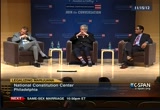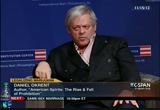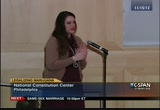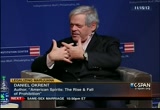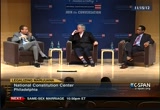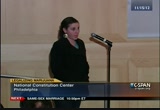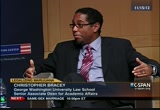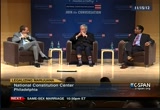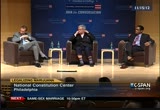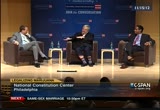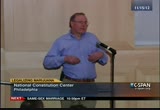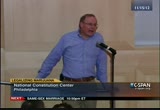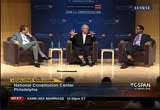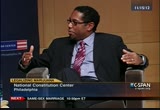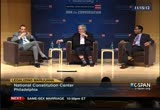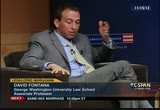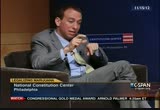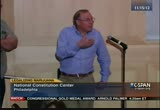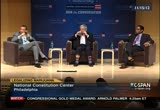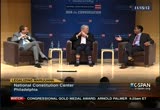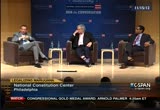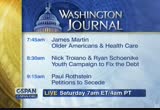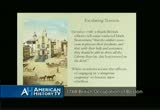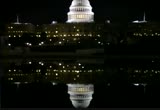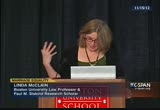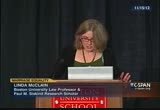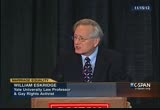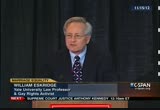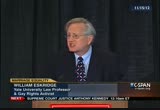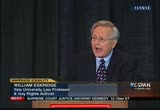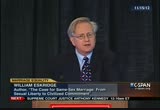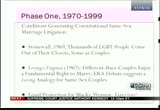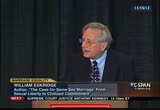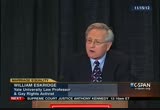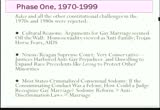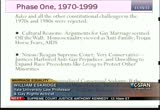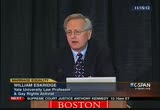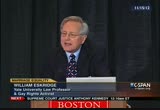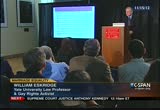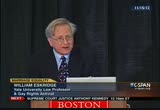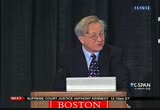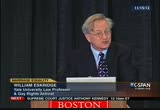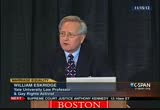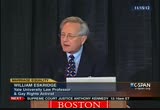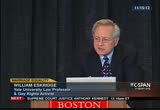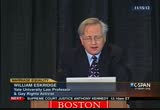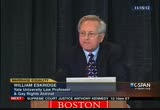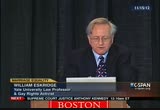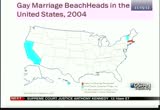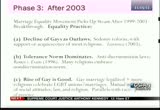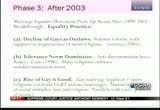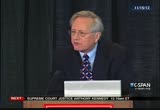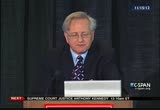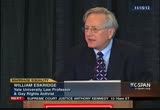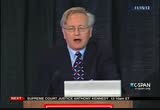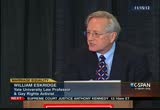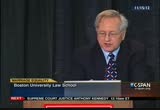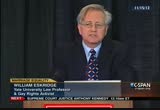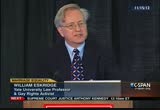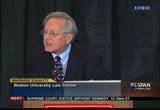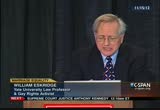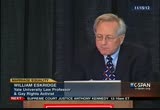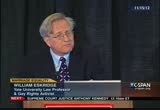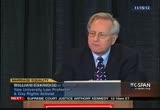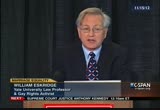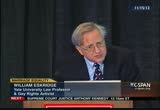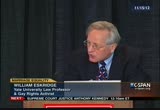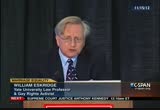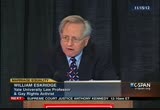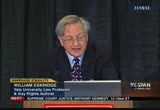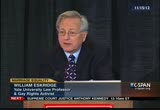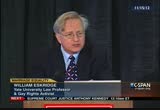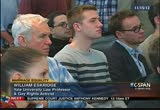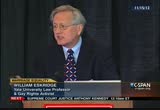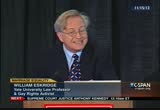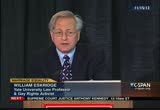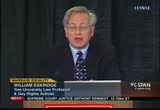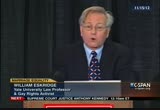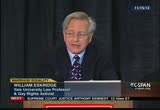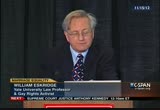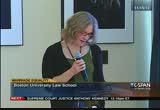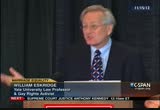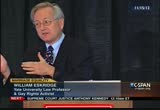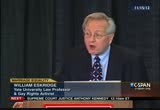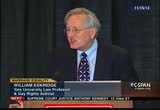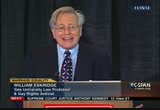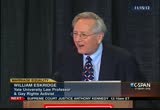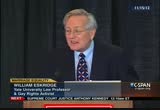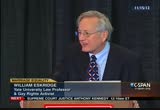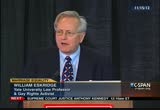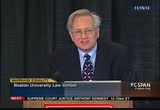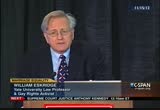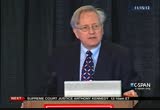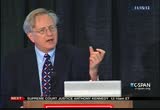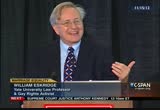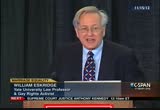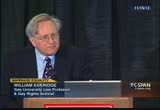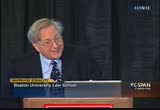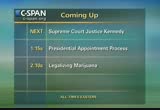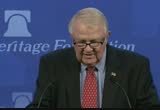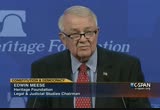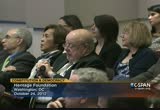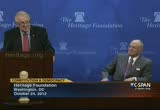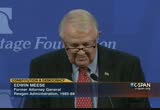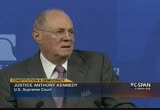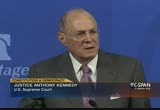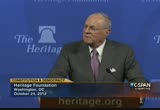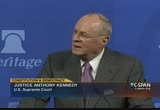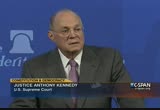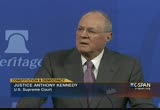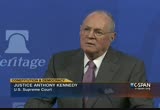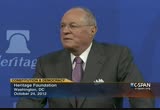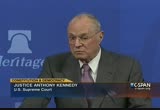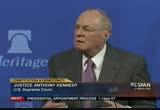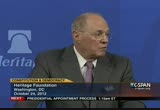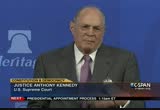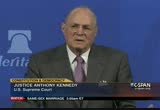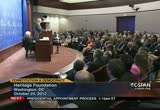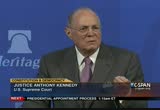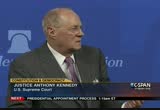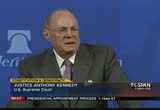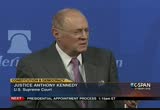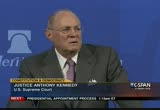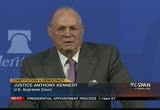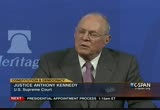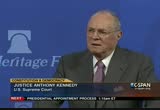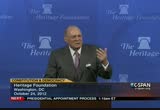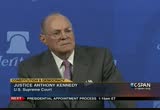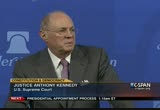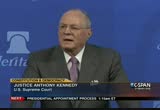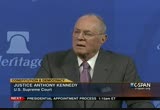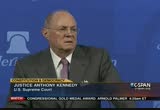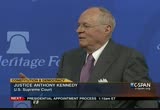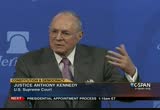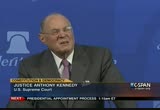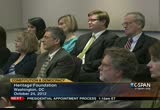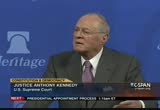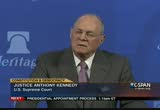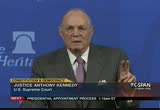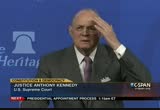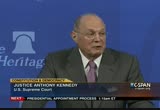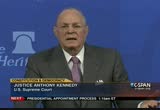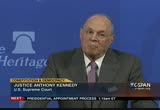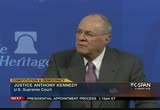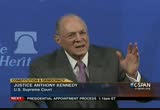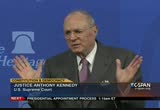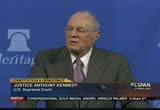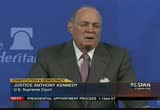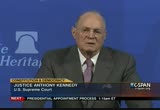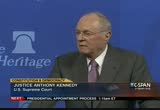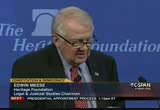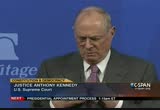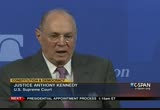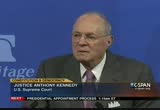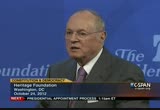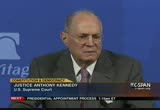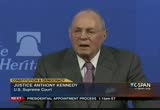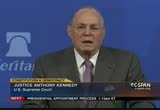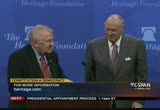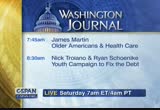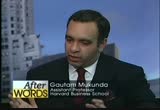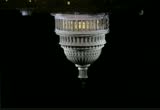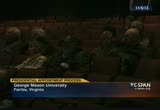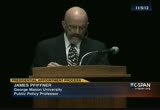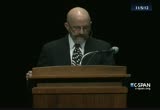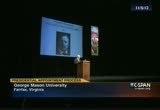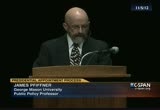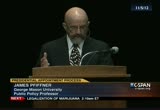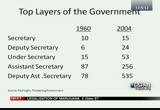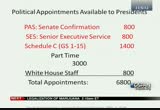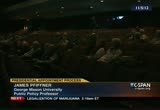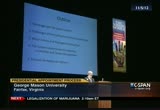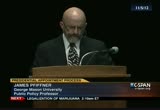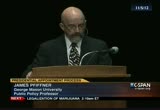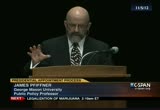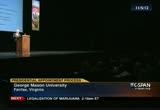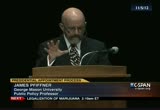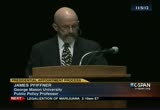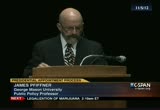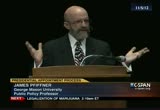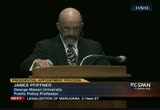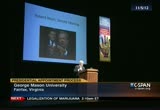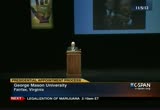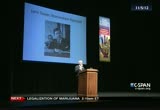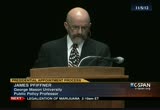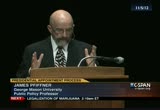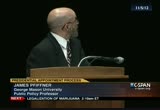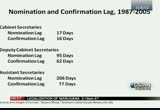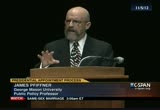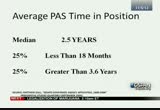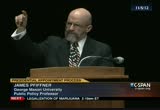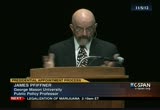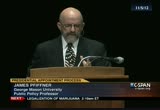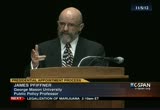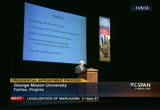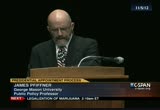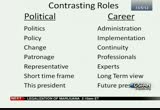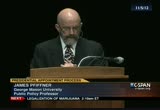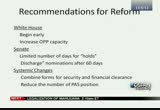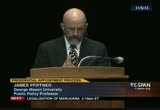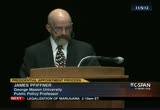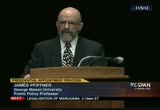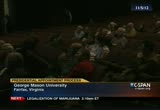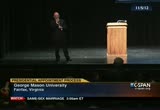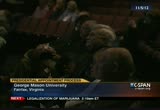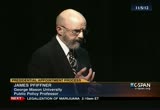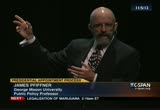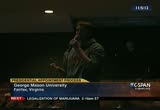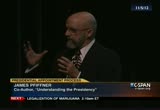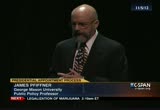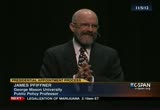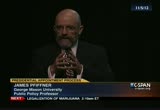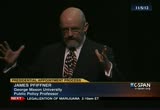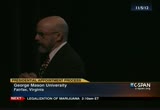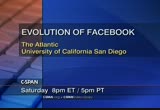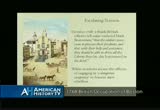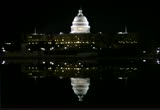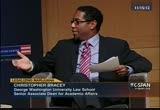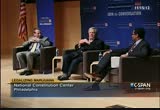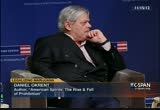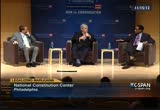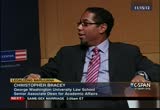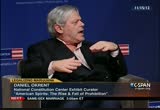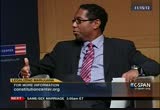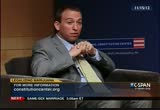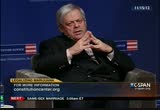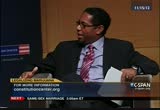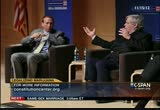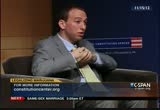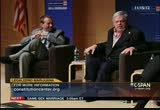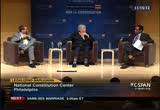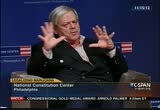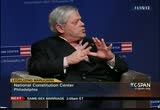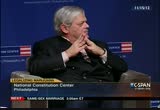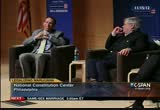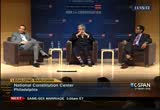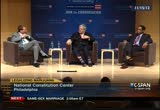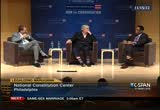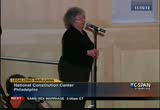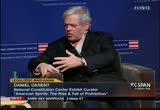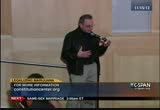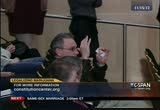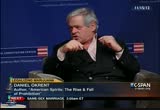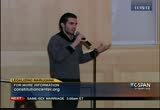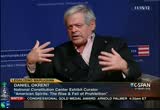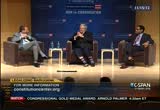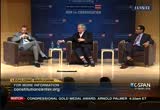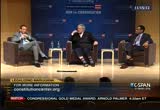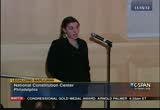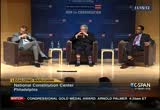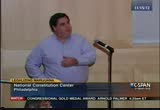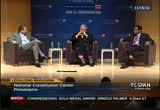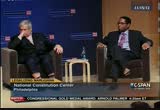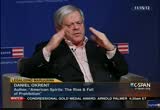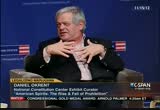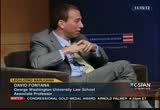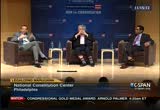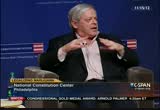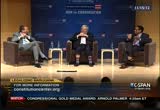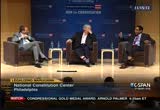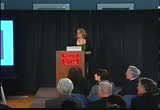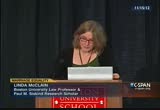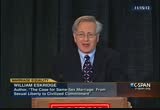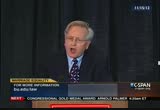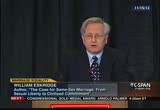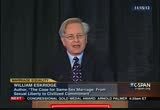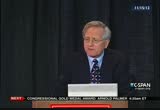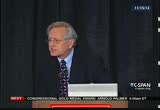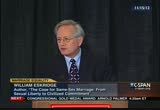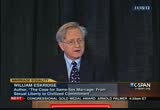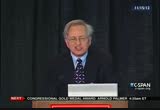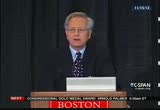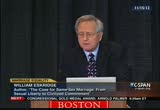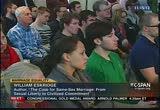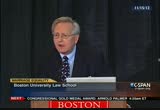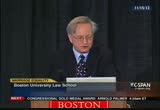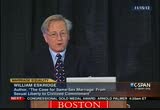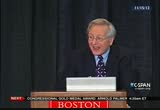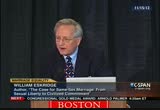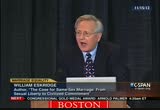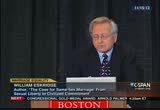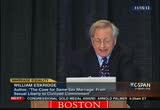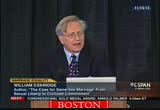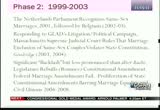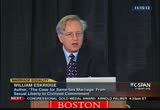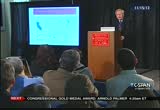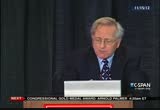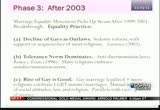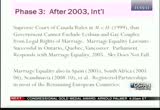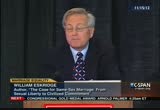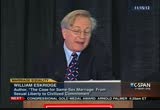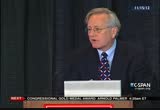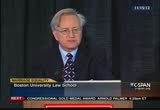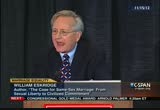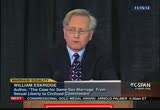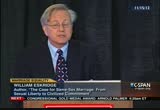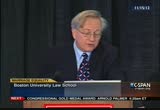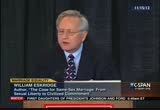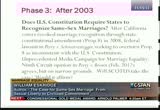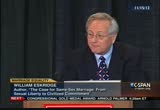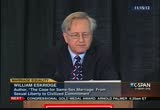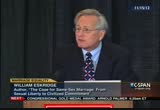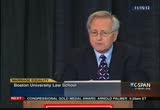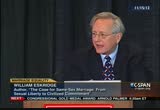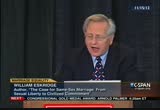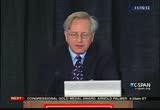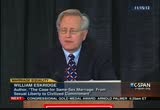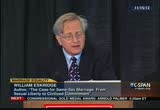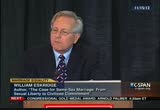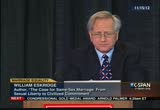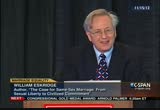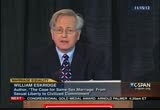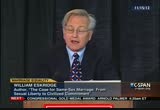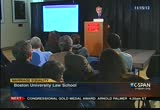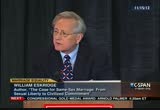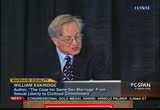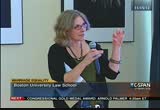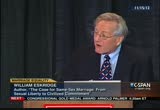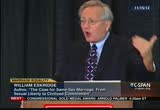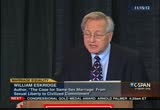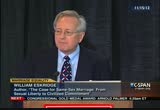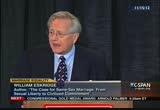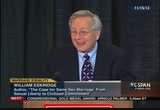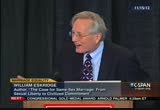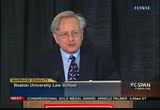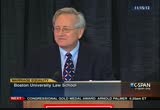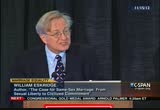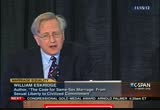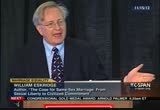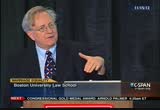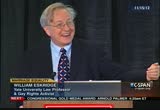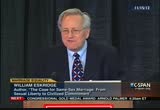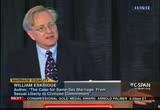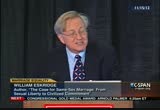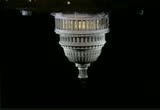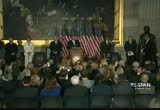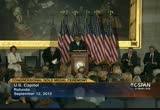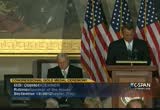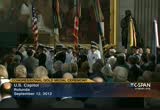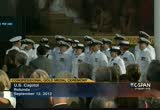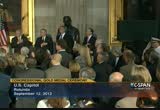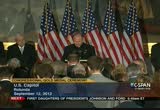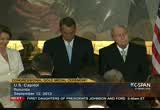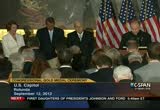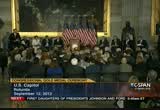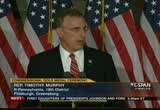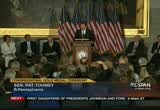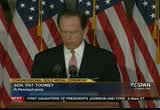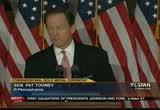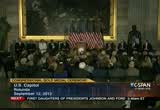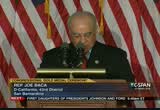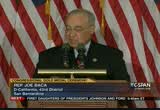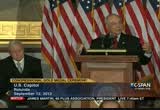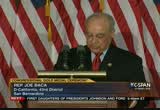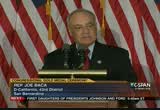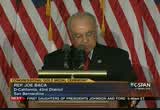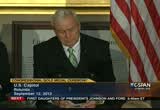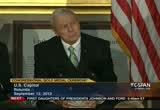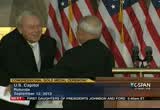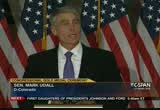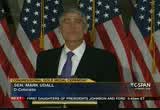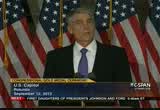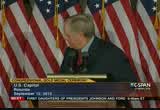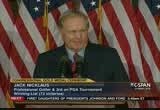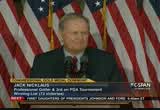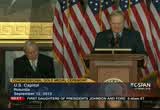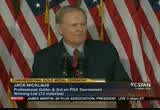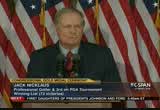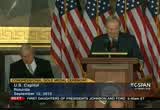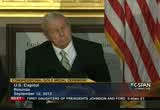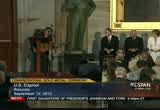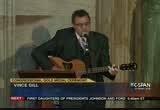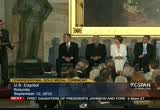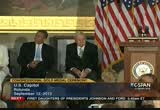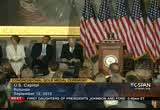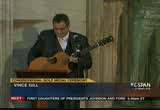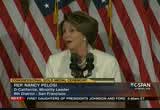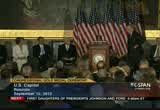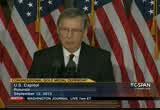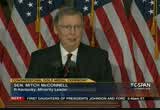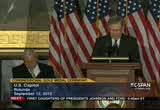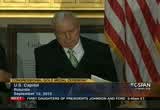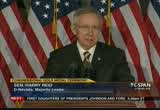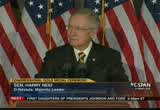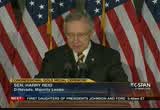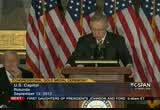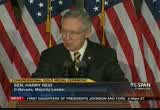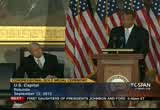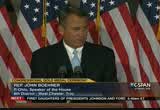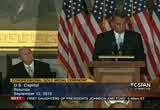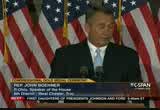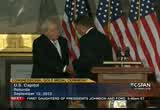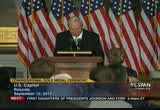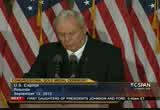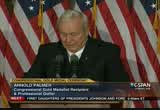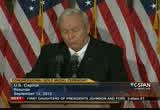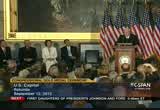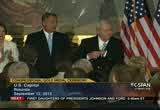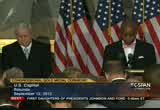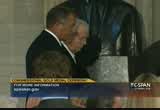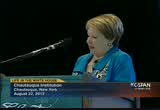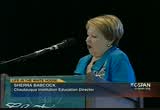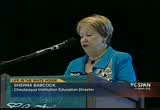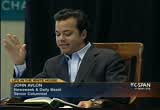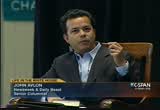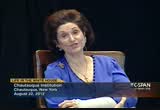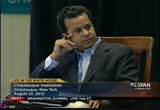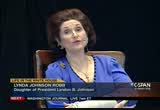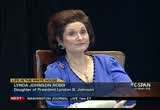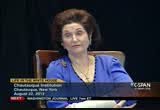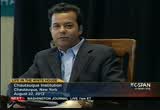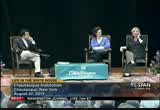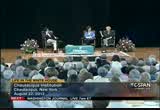tv Politics Public Policy Today CSPAN November 23, 2012 10:30pm-6:00am EST
10:30 pm
thank you for doing this. i'm here with my political philosophy elective and we are looking for some terms to discuss the broad issues at play. i am wondering what are the best set of terms to discuss a policy failure, like the war on drugs? is it simply a question of return on the best meant that the money spent versus results seen or a question of the rapid expansion of government? is there a more moral dimension? the incredible rise of incarceration rates that have had a profound affect on certain committees? what are the best terms to discuss this question? >> all of those of very good terms. another i would add -- it has to do with cell definition 3 who are we at the people, as a society? the war on drugs has been going
10:31 pm
on for 42 years. i do not know any other war we would tolerate going on for so long that we will losing in spending so much money on. as a people, we are a civilization that believes he should not do things that are bad for you and that for society. that was a big motivation behind prohibition as well. this matter of what you believe is more important what you can accomplish. how you translate that into the language of political philosophy, i am not sure. but i think it is an area -- an important area of pursuit. none of these are efforts to legislate morality. they are efforts to legislate against human desire. back cannot work. i am a student at george washington university. there is a large push from the and the price of a community about legalization of marijuana.
10:32 pm
-- from the undergraduate timidity about legislation and marijuana. could this lead to a nationwide reform movement? >> it is different. i presume the undergraduate movement at gwi is people who want to get something. temperance movement was to deny somebody else opportunity to get something. the women's movement that was the firast mass move apart -- movement for prohibition was very noble. women were victimized by prohibition in horrible ways. women have no voting rights, the bourse was a rarity. -- women had no voting rights, divorce was a rarity.
10:33 pm
it was an effort to free the family, free women from this. it is hard to get my arms around comparison between that and an undergraduate desire for marijuana. >> most major changes in the country, from popular movements, some of them start on college campuses, some in other places. >> there is a meaningful parallel. it is generational. the same generation that is most comfortable with one is the generation most comfortable with the other. >> there's no political party behind it. we talked about prohibition as being a bipartisan movement. in light of these causes were bipartisan -- a lot of these
10:34 pm
causes were bipartisan. but neither of the major political parties have gotten behind this. until that happens, it is hard to get -- >> in 2010, there was not a single elected official of the california who came out in favor. >> leveraging technology in cording efforts. to the extent this is an issue that is galvanizing young people at gw, chess is there are an ability -- chances there are ability to connect with students at other universities. you never know. the ability to leverage technology to form a movement is something young people have invented with these days. >> i have a questing going back to the drinking and driving. when you're pulled over, they
10:35 pm
have a breathalyzer that can tell how much alcohol as in assistant. if someone were to be pulled over and maybe they smoked marijuana at the past hour, that thc would still be in their bloodstream it is smoked marijuana a week ago. it the are pulled over and the test says you have thc in your bloodstream and you are driving completely not under the influence, what kind of device could be made to make that a fair argument? >> it would be much larger constituency about creating that device. >> beyond that, law enforcement has other techniques. they do not need a special device. there is still reckless driving on the books, the power of the nation -- of observation and other evidence that can be
10:36 pm
relied upon. the same outcome to restrict -- >> can odor be introduced as evidence? rex the officers perception of an odor can. some potential evidence. >> talking about regulating the illegal drugs, they mentioned that 80% of the position painkillers in the world are sold in the united states. five percent of the population of the world's 80% of the world's painkillers. drug related overdoses for death -- close to 70% were from prescription drugs. even the drugs that we regulate -- we do not seem to be doing too good of a drug -- of a job at a lot of people are dying to reque. >> we would not have any car
10:37 pm
fatalities if there were no cars. i do not need to make light of what you're saying but the fact that failure of the peace and not condemn the value that exists for these other off -- these other. this brings up a larger 0.3 legalization does not -- a larger point. whether drugs are legal or illegal, they're still drug abuse. there is a question of what a lot about it but there is a larger question about what we can do to make sure people have a healthy relationship with substances. quaff please tell me if my
10:38 pm
question is too simplistic -- >> please tell me if my question is too simplistic. is marijuana 83 drug to opiates and other drugs? -- a gateway drug to open its and other drugs? >> there is scientific research and reports that signal to me that it is not a gate we brought -- a feat way drug. but as someone who was not particularly familiar with marijuana or other drugs, it would be in a parable -- an empirical proposition. >> even if it werem , i do not
10:39 pm
think that is enough weight against legalization. the people who want marijuana today can get marijuana today. it is not difficult for anybody. if it is a gateway tomorrow, it is because it is a eight way today. i do not think that he did the dynamics. -- that changes the dynamics. >> i grew up in the error of -- right before they lower the drinking age to 18. in high school, the easter drug for people to get my age was marijuana. - the easier drug for people to get my agent was marijuana. selling to a minor was not that big a deal. but because you are put into
10:40 pm
that situation, the same person who sells said, because it is an illegal situation, is also the same person who will have lsd, cocaine. some of these other things. all of which, i tried at the time. not because i was planning on it. you are young, curious, you do it. in the sense that it is a gateway drug, it is partly so because you are forcing people to go into a situation where they are by definition of legal. it was easier for a kid to get a drink in philadelphia during prohibition and was afterwards. is the same thing. it is easier for someone to get a harder drugs with marijuana being illegal because you have no toasts but to go to someone who is committing a felony to sell it to you.
10:41 pm
-- no choice but to go to someone who is committing a felony to sell it to you. i know there are various treaties that have to do with drugs. i know the united states has -- enforces policies on other countries. if the states and the u.s. were to go to legalization, are we going to get ourselves but the trouble with any international organization or treaties we have signed? >> i did not know much about the treaty arrangement that the regulation drug distribution but i did read an interesting article that said the greatest loser when it came to the legalization of marijuana in the state's where the drug growers in mexico. that is not a treaty arrangement but obviously an economic arrangement that may have some political ramifications beyond just drugs. >> the prohibition counterpart
10:42 pm
to that, i enormous amount of liquor came in from the u.k. directly to the bahamas. nasa was a town of 700 people before prohibition -- nassau was a town of 700 people before prohibition di. the colonial secretary of the u.k. at that time was winston churchill. we can imagine what he thought about prohibition. he called that a front to the entire history of mankind. . >> if you could talk a little bit about the importance of studying constitutional history. that is what we're doing here. talking about lessons from prohibition, lessons of our experiments with the constitution. things to take from it and not repeat again. what do you take from that?
10:43 pm
is it important to learn lessons from our constitutional history? >> to me, it is the anomaly of prohibition in the constitution. the constitution exists to limit the powers of government in the lives of individuals or relative to the state. only in two places where the rights of individuals ever limited -- the 18th amendment and the 13th amendment. the notions of these two things -- the lesson that our history says, do not get involved in the people's lives. we've a lot of other things to be concerned about. the referendums and initiatives handle that. >> there are several important
10:44 pm
constitutional doctrines and will that come out of prohibition. its 1920 and 1933 during the prohibition era, there were 20 cases under the first amendment. three-quarters of them are related to prohibition. omstead is a major supreme court case about the power of the federal government and police to search for private items. there are important will that we still live under today that come from prohibition. perhaps more sic degette -- more significant is that anything can be done under the constitution. we can pass something under the constitution and then 13 years later, repeal it. article 5 of the constitution was talking about amending the constitution, as short as part of the constitution. it was very out in the air before prohibition as to what he
10:45 pm
can do for a constitutional amendment. afterwards, the supreme court challenge whether a change the constitution too much. this is the only constitutional amendment repealing provision -- the peeling prohibition that was done by ratifying convention, rather than the state legislature. prohibition kind opens the doors to all different types of things being it into the constitution. every political argument we have had in our history has a constitutional dimension. sometimes it is because what is being done is challenged under the constitution. often what people what to do, they phrase in the language of constitutional law. it is not that the constitution is some documents and external to what happened in every day
10:46 pm
life. it is in the middle of it, affecting what we're doing. every major political issue we have had even now, health care, financial reform, foreign policy, as very much a constitutional issue. >> tying those things together, one of the port legacies of omstead was the opinion that was against wiretapping that said the constitution contains were suggested it right to be left alone. those are precisely the words that potter stewart used 40 years later in roe v wade. we have prohibition giving us that. >> when it passed prohibition,
10:47 pm
they chose a constitutional amendment route. why did not they just do it with lots back then -- with laws back then? >> because laws are easy to un- do. we could have the experience now with affordable health care act. if you put it in the constitution before it ever been a repeal of an imminent, it was there for ever and beyond the reach -- beyond being affected by the rebels and waves of partisan politics. >> prohibition is based on the 18th amendment prohibition about col. but as the constitutional hope for prohibition of any drugs? -- what is the constitutional prohibition of any drugs? >> sometimes the federal government can condition states accepting money from the federal
10:48 pm
government on states prohibiting. south the cosa -- dakota, a big case about the drinking age. it tells state if you want this money, yet to make certain changes about what eight people can legally consume alcohol. everybody in these places can or cannot do something. some of it is a contract. they tell the state we have the money for you, if you want it, you have to tell your citizens to do certain things. [inaudible] >> it is based on the commerce clause. that the federal karmic to prohibit schedule one of products like marijuana under the congress law. certain parts of the supreme court cannot believe in the
10:49 pm
commerce law any longer, maybe things will change. 6 justices that voted in favor are still here. >> no final thoughts from me. >> talking about prohibition, this always comes up. i am struck no one stood up to say we have to keep these laws in place. that is a big chains. i am sure there are some people here who believe that but has become socially unacceptable to say so? that would be similar to our acceptance of other things like same sex marriage. >> from the constitutional perspective, i think we talk about the constitution as having a few major moments -- the new deal, the civil war -- the was
10:50 pm
another major moment, prohibition. we have to pay attention to the debate over prohibition as well. >> the study of constitutional law is a study of american people. an exhibit book capture a moment in american life that is distinctive and unique and worth studying. >> let's give a round of applause. [applause] [captioning performed by national captioning institute] [captions copyright national cable satellite corp. 2012] >> tomorrow, all americans and health care. with james martin. followed by a discussion with the co-founders of the youth lead campaign to fix the national debt. then in the depositions to secede from the united states. we are joined by a georgetown
10:51 pm
university law professor. washington journal, live starting at 7:00 a.m. eastern on c-span. but what soldiers now placed on century duty on the road in and out of boston and on guard outside the homes, officials and with british artillery now aimed at the town house of the general court, it is easy to understand why many boston residents felt threatened by the occupation. many he is how some soldiers try to stir up racial tensions in their town. not everyone in boston is white. for instance, with an -- within a month and there are rival, three british officers had been discovered encouraging some african american slaves in boston to attack their white masters. one of the stock officers
10:52 pm
assured these black bostonians that the soldiers were there to procure their freedom and that with their help and assistance, we should be able to drive all the liberty bowl is to the devil. while that slaves he talked to ignore these lies, the british army was not there to free the slaves. several white residents marched complaints -- loged complaints. >> colonial life in british occupied boston, saturday night at 8:00 eastern, part of a holiday weekend now through monday morning on c-span3's american history tv. in discussion now on marriage equality with william etherege, a yale law professor. voters approved to legalize same-sex marriage in maryland, maine, minnesota, and washington
10:53 pm
stake in the last election. this is about an hour and 20 minutes. >> good afternoon. i am linda mclean. it is my honor and pleasure on behalf of the dean of the boston university school of law and on behalf of the back of the workshop committee to welcome all of you to the law school's annual distinguished lecture and to introduce a professor etherege jr., a professor of jurisprudence at yale law school. the annual distinguished lecture is a highlight of our academic year. we are fortunate not only to have a preeminent legal scholar addressed as but also to have him addressed us on a topic that could not be more timely. in the publicity for this lecture, the title was the long road temerity quality, 2012 and
10:54 pm
beyond. biya -- the revised title, beyond backlash. the time and as of this topic explains why c-span is taking this picture and will broadcast it to a live audience. if you have not already, turn off all pagers, cell phones, and mobile the voices before we began -- devices before weakened. another note, during the q and a portion of this advanced -- of this event, please stand and wait until a volunteer handed a you ahone = -- hands microphone. professor at the rich has had the task of updating his power point slide after his door outcomes on november 6 in maryland, maine and washington
10:55 pm
were voters approved a ballot initiatives in favor of allowing same-sex couples to marry and voters in minnesota rejected a constitutional amendment that would enshrine the ban on same-sex marriage in its state constitution. we are excited about this opportunity to put these recent developments in a historical perspective. as you will see from the publicity about this lecture, prof. etheridge could easily adjust us about legislation, he is also an architect in his field of law and sexual orientation. today he is addressing a topic to which he has devoted enormous effort -- merit equality. his analysis has influence litigators, judges, lawmakers, as well as scholars and law
10:56 pm
students. i will briefly mention three features of this work that had been broadly implied jill and from which i personally benefit in my own work. he honor the history of same-sex unions taking on the claim that same-sex marriage is simply unheard of and his work on the history of the struggle for same-sex marriage in this country took on the claim that for the most part, the gay rights movement was not interested in marriage. he has advanced norm to argument in favor of same-sex marriage. as compared to work on the state -- on the treatment of same-sex couples have shaped the debate. his book -- he wrote about the america in scandinavia into conkling's by conservatives that
10:57 pm
when countries legalize marriage, a casket of disasters be false the institution of marriage and family. his compared a work also introduced to american audiences the theory of small changes which is that country to deplete follow a pattern of -- a pattern along the pathway to full equality and liberty for gay men and lesbians. this has provided a hopeful context of the civil unions obverses marriage issues. without further ado, it is my great pleasure to introduce you to our distinguished lecturer, william eskridge junior. [applause] >> i appreciate the invitation and that wonderful introduction by professor mclean his own work -- book is coming out next
10:58 pm
week which will address some of the issues i will talk about today. my life -- my first slide, there is nothing new about marriages. the same 60 multiple pattern on his own sister and her longtime companion. we've come a long ways since the janes brothers and sisters,. . this is one of the most exciting areas of public law today. the law review will publish this and i will advance some new arguments in this lecture. this is one of the most dramatic of our public law and
10:59 pm
constitutional issues. it is more dramatic even then watching television. which television show you are watching the pence on where you are coming from -- depends on where you are coming from. i think this is an analog modern family. i think same-sex marriage is delightful. i think it has a future. and then the contras, however,-- in contrast, however, rosenberg has argued that same- sex marriage is not much like modern family as it is like revenge. i can see there are not many tv watchers in this audience. revenge is a show that is not about happy families.
11:00 pm
it is about six families and the revenge that happens when things are stirred up. same sex marriage litigation has led not on the whole to advances for lesbians and gay couples but instead to revenge. and backlash. a third story that might be told and i don't think that is presented in this lecture, another story by the many sincere traditionalists, a lot of religiously motivated to think that same-sex marriage is not like modern family, is not like revenge, but instead like homeland. at the very famous series about a trojan horse former prisoner of war that was burrowing into the american body politic and will ultimately destroy america.
11:01 pm
those are the three television stories. let me start at the beginning of the litigation because there were not falls led marriage litigation's. i wanted to talk beginning at the stonewall riots in new york in 1969. it represented the first time in recent history that lesbian and gay people literally fought back against the longstanding police oppression. there were several evenings of riots. they galvanized literally tens of thousands of lesbians and gay men to come out of their closets or they had been residing in to announce themselves.
11:02 pm
this was the first time that large numbers of bisexuals at transgendered people had come out and responded publicly. as people that were committed to one another in a longstanding union, sometimes they were even raising children together. some of them had the asperity to argue that not only are we openly gay or lesbian and committed same-sex partner that i raise children with, but i also think that we have the right of the state to recognize our unions as civil marriages the same as different sex couples. interestingly enough, at the very point with a fair number of same-sex couples started thinking this way, there was a landmark supreme court decision , it handed it down in 1967 and
11:03 pm
struck down the remaining laws in the south that barred marriage is by different race couples. it is race discrimination and suspect as a classification. we're going to strike it down because there is no compelling justification. they also ruled that discrimination by the state violated couple -- many in the 1970's all way through today have taken that language and subsequent decisions to assert that lesbian and gay couples have a fundamental right to marriage.
11:04 pm
subsequently, in the debate in the united states, banning effectively sex discrimination, this will lead immediately to same-sex marriage based upon an analogy. because the opponents suggested that, i think, quite logically, that if you have a woman and woman with a licence, it denies this because her partner is not a man, it is literally discrimination because of the sex of the partner. some people argued in the early 1970's that it should be required by either the federal or the state era's.
11:05 pm
like other groups, and women themselves, they began to see themselves as a minority or cohesive minority that should not be treated unfairly. and for whom discrimination based upon sexual orientation was just as irrational a point of view as race and sex discrimination. it might surprise you to know that serious constitutional lawsuits with the aclu was 40 years ago, baker vs. state. they brought the lawsuit that rejected an effort to ban gay marriage by a constitutional amendment. when it got to the supreme
11:06 pm
court, baker and mcconnell got at least one of the supreme court justices literally turned his back on their argument. he turned his chair around as the aclu was making the argument for marriage equality. not a simple justice to ask a question, they wrote a short opinion denying the right and the lawyer took it to the supreme court which dismissed the appeal for lack of federal question. they were very successful as the baker lawsuit was. we will see why they were uniformly unsuccessful during that time. arguments for gay marriage
11:07 pm
seemed off the wall. marriage is a matter of -- it was strongly associated with procreative unions between one woman and one man. there is also the widespread perception even among liberals that gay people were intrinsically anti family. they were non-procreative unions and could never be the basis for the elevated institution we call marriage. andyou get to a 1980's there was even further antimony against lesbian and gay claims for quality. and the fear of aids in the trojan horses like gay men bearing the aids virus created a climate of overwhelming hostility.
11:08 pm
that is the main reason, and i think the supreme court would not have been receptive to these claims. the nixon and reagan supreme court were a very conservative collection of justices, most of the justices themselves harbored anti-gay prejudices and almost all of the justices were reluctant and some utterly unwilling to expand the president to protect other minorities. and the laws that made it a crime, usually a felony, to have consentual sodomy with an adult partner in a private space.
11:09 pm
there was a political conundrum that how could you recognize gay marriage if the underlying consummating sexual conduct is a felony in your jurisdiction? and that is a logical as well as cultural conundrum. this is 1999, in fact. the state of union throughout the twentieth century. i don't know if you want to write down some of those studies, but there is the math. the 1990's is a major turning point. there were many other terms in that decade.
11:10 pm
i was actually the attorney in the first case after denmark in 1989 recognized same-sex registered partners. it specifically motivated some of these earlier litigants. my clients at the district of columbia included one lawyer that was [indiscernible] they read about the danish statute and said, why can't we do this in the united states? they got yelled at, took it to their legislators, a distinguished catholic institution, they got themselves a lawyer. they brought it in hawaii.
11:11 pm
11:12 pm
of a dreaded disease that america hates and they hate you as well, to move from being despised and anti-american minority to a barely tolerable one is the best news in your life. that is what happened in the early '90s. and further courts revived a strong interests in the state constitutionalism to protect the rights of minorities but the voter was not willing to do it. the supreme court decision upholding consentual sodomy laws in the state of georgia where you could receive 20 years in prison for sodomy for consensual
11:13 pm
activity, but in the 1990's, one state supreme court after another in some unlikely places like georgia and arkansas and tennessee strike down the sodomy laws under their state constitution. it culminates in texas in 2003. within this climate, it seemed like the time was right. the other case we lost two-one, and in retrospect, it was a blessing for the movement. in the ones they we did when the litigation, the hawaii supreme court in 1993 under their state tentatively made a
11:14 pm
feint in the direction of marriage equality by ruling that lesbian and gay couples -- they remanded for trial to see if the government could meet the burden. in 1993, there is a tremendous backlash against the supreme court ruling that same-sex marriage might be on the horizon in that state located thousands of miles away. even continuing until today madt will not recognize same-sex marriages because it might infects the body politic with this disease.
11:15 pm
even hawaii, the voters voted 60%. the national republican party in 1996 seized upon this as a possible wedge issue. to take away catholic at southern baptist voters from the democrats. they were proposed to ratify the recognition laws and also to permanently codify into the federal statute books the proposition that the 1100 federal regulations that pertain to marriage will never pertain to same-sex couples.
11:16 pm
president clinton did not resist the statute and joined in and support of the statute. leaving you with a spectacle in 1996 of speaker gingrich of the house, majority leader dole of the senate and president clinton of the united states, the leaders of their respective parties, the latter two for candidatecandidates for presided the three highest ranking adulterer's in the united states sponsoring an effort to protect marriage against lesbian couples, raising children in committed relationships. only in america. the '90s was not a big era for a advanced in many respects.
11:17 pm
it also inspired other lawsuits. i think a big breakthrough was in the neighboring state of vermont where the grass roots movement persuaded the vermont supreme court to strike down the exclusion of gays and lesbians from all of the benefits and rights of marriage, but they left it to the legislature to provide remedies. in many ways, i think it was a brilliant move because in 2000, in a bipartisan effort, dominated more by democrats established a civil unions law survived the inevitable political backlash in the 2000
11:18 pm
11:19 pm
and a very intelligent political campaign, they nearly ruled that marriage exclusion of same-sex couples violates the state constitution. they give the legislature several months to implement this, reaffirmed in 2004 when they met the mandate. in may of 2004, for the first time in the united states, officials started handing out marriage licenses and nullified in previous campaigns. they argued there was a backlash against the decision in massachusetts. does backlash was much less
11:20 pm
pronounced. in the state of massachusetts, the persistent campaign to amend the constitution was rebuffed at every turn by the legislature. president george w. bush's campaign with the federal marriage amendments did not get through this said. , the cloture vote and the supporters of the federal marriage amendment could not even secure a majority. to be sure that there is a proliferation of states and a crucial amendments mostly by initiative, even sometimes civil union claims in 2004 to 2008. nonetheless, we start to get color in the map that i gave you before.
11:21 pm
recognizing full marriage equality and substantial equality in vermont and california and a modicum of equality in a way that had their reciprocal beneficiaries law. it is the big breakthrough. the marriage ecology movement -- the quality movement picked up after that break through. it has been a normative movement in each state and has shown the following progression that each state has moved at a different pace. they had the to confront the idea that gay people were outlaws. most of the states had already repeal of these laws and
11:22 pm
nullified them by 2003. the more important innovation during the time we are talking about is the adoption and anti- discrimination laws. a number of other states have followed massachusetts in some form, prohibiting discrimination based on sexual orientation. most of the state laws also prohibit discrimination, many of them also with other venues. the famous supreme court decision that struck down an effort by colorado voters initiative to sweep away and permanently prohibit these type of anti-discrimination rules at the state or even municipal level. many religions including the roman catholic side aggressively and actively denounced discrimination based on sexual orientation.
11:23 pm
finally, there has been a rise in many jurisdictions of the day is good idea. a significant number of the populace believed that not only is gay not malignant or worthy of being outlawed, it is actually five and a good and i don't mind if my daughter mary is one. in this jurisdiction we have seen the biggest audiences where gay marriage is recognized, and the religions have celebrated lesbian and gay unions. and as we have seen with race, it changes in social attitudes in a direction towards even acceptance. at the same time massachusetts is acting in this very important
11:24 pm
way, our neighbor to the north is going through exactly the same kind of cycle of litigation, push back, and a tentative case legislation as well. the landmark decision in 99 prohibits family based discrimination in terms of rights. that prevents the marriage equality lawsuits at the provincial level and decisions supporting marriage equality, and shortly after they adopt marriage equality statute, this guy did not fall on canada and it has survived under conservative government as well as liberal government. we have seen marriage equality in spain, south africa, scandinavia. most countries and the rest of the world. in europe, if you don't have marriage equality, you are likely to have registered
11:25 pm
partnerships. here is the list of situations in the united states. the map as suggested has been updated to take account of last tuesday. i have not had to on color anything based on results and you see the pattern. it is very significant, a lot like europe. except new england has us playing the role of scandinavia and even kind of similar. we're cold, close together, we're very cultured, it is splendid when and adopting same- sex marriage. the only holdout is rhode island that has civil unions and i am sure they will rectify that very soon.
11:26 pm
i wrote in 2006, we laid out here is the data base upon legal changes. the states that would adopt marriage recognition in the next 10 years, another color was battleground states and the other color was home states that would not. they are exactly the states, the color maps are exactly what we thought. it has been very predictable. the third group of states i described are not going to adopt marriage equality any time soon and will have battleground states like pennsylvania, ohio, that is the kind of state you would expect. that is where we are today, and it is a long road. and obviously, most of the country is not colored in, so
11:27 pm
there is a long way to go. this is certainly my point of view, he probably believed it is now inevitable that there is no turning back on marriage equality for the very simple reason that the lesbian and gay couples that have gotten married or who want to get married, many of them raising children are actually good couples. they are fine. they want to be married for the same reason that the straight couples do and want to have children for the same reason. those families operate the same. and it is actually good for america. it is not a big deal, it is a good deal. young people realize this and old people who do not are dying.
11:28 pm
that is the long-term prognosis. this is why you see one of the witnesses, the only two for supporters of proposition 8, one of the witnesses has already recanted. you ask him why. he said it just seems inevitable to be doubted if it does not seem to me to be a great calamity. i think that is a widening perspective. and also a widening perspective that this is the great civil- rights cause of your generation and is something to be on the right side of and not on the side that looks like george wallace. it is still a very intense issue, and there are people that disagree with one another on this issue.
11:29 pm
we are still going to see state popular initiatives. most states have constitutional amendment barring same-sex marriage, those would have to be revoked either by a new voter initiative or by some kind of federal constitutional litigation. obviously, california is the primary example of that. california in 2008, i talk about this at greater length in my article. it requires marriage equality in the state of california as something like 18,000 marriage licenses were issued. between july of 2008 and november 2008, the latter date when proposition 8 was voted in by the people of the state of california to amend the constitution to override the court. the court interpreted as not
11:30 pm
qualified for the marriage licenses that have already been given out. there would be two ways of responding to proposition 8 aside from acquiescence which is not a possibility. the more logical one would be to go back to the voters after a more educational campaign, the kind that they just had in the state of maine and responded fairly warmly to. in my opinion, we had a lost opportunity in 2008 in california. based upon expert opinion, the campaign against was mainly run in glittering generalities. i think it is a very poorly idea to run a political campaign. suggest that there are a lesbian and gay couples, hear their
11:31 pm
voices about why it wants -- why they want to get married. what it means to their children, here is what it means to their neighbors, their ministers, the rabbis, the priests, some of whom do not support same-sex marriage, but support these couples that are serious couples seeking recognition of their serious relationships that are long-term and raising children. that is the wish to have run it in 2008, i think that is the way they read it in maine in 2012, we would have won such an initiative in 2012 in the state of california. astute watcher of the election results, there was no initiative on the california ballot along these lines ha. the reason was a federal lawsuit which was brought in the wake of proposition 8 to
11:32 pm
challenge the discrimination as a violation of the people's protection laws. that suit is before the u.s. supreme court which is considering whether or not to grant review. if they don't grant review which is more likely, they will have the ninth circuit do some more thinking. at some point, i think we will have same-sex marriage in california. it would have been a simpler and more legitimate process if we had done it through some kind of voter initiative. at the same time, we are now seeing the federalization of litigation on marriage equality. the parallel federal constitutional litigation, remember that? president clinton, senator dole, speaker gingrich. so there had been a number of
11:33 pm
challenges to doma and it is imploding. there are dozens of bankruptcy judge's ruling that it is unconstitutional as applied to the statutes that they are implementing. the attorney general says we are not going to defend the constitutionality anymore, though the administration is still enforcing it. there have been decisions now, our circuit, charcoal and of graduates. i believe two of the three panel members struck down the defense of marriage act and i think the first would be a very solid foundation for a supreme court ruling. it will issue some kind of result next june.
11:34 pm
the final question is the pairing question, the proposition a question. does the u.s. constitution requires states to recognize same-sex marriages? mclean suggested and i argued in 1996 that the constitution as a matter of principle does prohibit such discrimination. the question is not as the constitution prohibit it? i think that is the right answer and i believe that is the answer people will have to reach as a society at some point. the real question is, do we want the u.s. supreme court to reach that result in 2013 by taking review and ruling as broadly as judge walker ruled, or do we want the supreme court to rule more narrowly?
11:35 pm
or perhaps the best result is for the supreme court to deny the review and send it back to have the ninth circuit reaffirm its and have same-sex marriage licenses start issuing in california again. this is an issue whose outcome is inevitable, but it is not inevitable that the answer will be delivered in 2013. the final portion of my talk and i will wind up, the major focus of the law review article. it also might be one of these things that is more certain. the long road i have just described, what i tried to do in the article, a theoretical basis for what political scientists have been calling a backlash.
11:36 pm
with about same-sex marriage or the equality debate in the united states, there are two different kinds of debates we have the engaged in. one is a policy debate, is there a need for it? would it cost money? serious thoughts should be done on that debate. the other debate that is going on in tandem is what i would call a small constitutional debate. it is constitutional and be very literal sense, not just of the society, but of people's identities. and so long as it has been for most of my life, as the debate involves intense identity politics on both sides, one thing we should not delude ourselves about is that lesbian
11:37 pm
and gay people consider this policy on our side and it is also identity politics on the other side. it is not an example of big hits that have to deny people their rights. the typical opponent of marriage equality is a matter of her own identity as a religious person, a member of the family, a member of the community believe that it does not behoove her community and her politics to depart from the traditional definition of marriage. if you are liberal, you find that hard to swallow. many of you in this room do not favor the death penalty. you're not just opposed to it, you're opposed to being part of society that has a death
11:38 pm
penalty even though you will not be subjected to it, at least most of you. and the reason you oppose it is not a policy reason, although i am sure you could give me policy arguments. the reason you oppose it is constitutional reasons. you don't care about the eighth amendment, you care about not being part of a policy that puts people to death especially if it is racially biased like it has been in this country. that is why they are on to something. this is an issue that has divided the country intently, very evenly even today. the way i see it, there is an evolution of what has been called the politics of backlash.
11:39 pm
for most of what i am talking about, minnesota baker to vermont baker, the politics of backlash has overwhelmingly dominated normal politics. marriage equality for years was simply ignored, and when it's brought to the public agenda and was actually in the front page of the new york times, it triggered a local and national backlash. traditional family values people were alarmed and that the gop was able to use it as a very effective issue but not effectively enough given the unscrupulous this of the sitting president. backlash dominated, and any effort to disturb the status quo was going to provoke an overwhelming response. the second half begins in earnest with the vermont civil unions debate which is saturated
11:40 pm
with backlash and also saturated with people that thoughtfully did consider the policy issues that changed their mind even about the backlash issues. i think we have seen that in this state, with the marriage people in california, and the litigation through new york that recognizes marriages quality. people's identities have been affronted. the backlash is very much less that it was and the issue is now balanced, i think, between a backlash of politics. taken from a silver on what the numbers look like, these are not members of backlash politics. early on, there is very little support for marriage equality. the numbers have steadily gone
11:41 pm
up, and the variable is good rich. it triggered a short-term response that was positive and negative, but i think the consequences, i believe since 2004, have been more than 10,000 marriage licenses handed out in the state of massachusetts. there is ballet choreography of the quality that we have not seen in the united states before. a year as the title of what i want to publish. it very much illustrated this year that we are moving beyond backlash. this is the what i usually thank, and not just those lawyers, she is great
11:42 pm
nonetheless. we should also extend a vote of thanks from new york and president obama and even his vice president for coming out of the closet as an openly straight politician who is in favor of marriage equality. and we saw the results in the 2012 election. this did not cause president obama the election, it probably helped him. he had a healthy margin of victory of the popular vote. his margin was larger than his larger -- that his margin of victory. there are lots of groups you could say it about, but is also true of lesbian and gay voters. the issue almost certainly helped president obama and did not hurt president obama. the lesson is not lost on the
11:43 pm
republican party. here are my concluding thoughts. it is a complicated history to were the long road of marriage equality, the beginning is a complicated answer about backlash and the popular analysis of what is going on politically. what i want to conclude with, this has been neglected by the backlash theorists, how the courts have advanced marriage equality. i think there have been three things about what the courts have done. from my point of view, the most important is a fantastically important setting for capabilities. the word marriage in our vocabulary only meant different sects. after they linguistically, the
11:44 pm
notion of same-sex marriage entered our vocabulary and is now no longer in quote marks. courts are capable of reversing the burden of political inertia as well as giving publicity to an issue and putting it on the public agenda. and in massachusetts, the first state to recognize marriage equality even though it was for a fraction of the people in the country, these are the laboratories of experimentation. and the point of why massachusetts is so important in this country is that this has created conditions for falsifying not only the policy argument such as the bill clinton argument that he needs
11:45 pm
to defend a marriage as a vulnerable institution against gay and lesbian partners with children, but it also falsifies the prejudices and the deepest prejudice against gay people in this country in my lifetime is the stereotype that gay people are anti family. they are selfish, their sexuality is sterile, the sexuality itself as intrinsically anti family. one of the things has been to falsify a stereotyped and provide a choreography of why that is simply not true. contrary to what everybody seems to say, a lot of the leaders,
11:46 pm
though it is better than john the famous historians saying that it cannibalized the homosexual agenda. it is simply false. there is a fabulous article by a political scientist that documents of the pro-gay agenda flourished during the same time we are seeing massive backlash. indeed, it was synergistic. i will use my home jurisdiction of the district of columbia to provide the example. d.c. reformed its consentual sex laws to make among many other things, consentual sodomy legal in 1981. the democratic controlled house
11:47 pm
of representatives overrode the district of columbia to reimpose penalties on sodomy. when the district in the early 90s created domestic partnership, congress was controlled by the democrats. congress is all consumed about protecting marriage against gays and lesbians. by the middle of its, the district of columbia in the mid- 90s reform to the sex crime laws and decriminalized sodomy. not a peep out of the republican controlled congress. it went into effect in 1994 and 1995, republicans resumed full control of congress.
11:48 pm
but even the most anti-base senators in american history introduced a proposal to override the district sodomy law review. there is a reason for that. i talked to religious leaders. it was the religions and other groups felt that the marriage issue was their wedding issue, but they didn't want to appear to be uniformly and overwhelmingly anti-gay. a very distinguished catholic theologian said in 1994, yes, the catholic church properly believes that sodomy is a terrible fate, but it doesn't mean that it should be a crime and we should really focus on other issues like marriage. that is exactly the way it worked out. there were lots of briefs, not
11:49 pm
one of your usual suspects and it reads for almost three dozen religious groups. not a peep out of the church of jesus christ of latter-day saints. they acquiesced and ultimately a constitutional right to engage in consensual sodomy. i maintain that not only did marriage equality helped deliver the gay rights agenda, it altered the agenda of the counter movement in ways that i think were very productive. this is a minor thing, courts can and do marginalized of lyre perspective that raises the stakes of politics.
11:50 pm
the u.s. supreme court, a conservative court supported -- appointed by reagan was a 6-3 vote that the citizens of colorado cannot disparage a lesbian or gay people and take away descriptions -- protections from them. it was a pervasive influence on anti-gay campaigns and rhetoric. it does not prevent anti-pay policies from being implemented, but i believe it has lowered the stakes of the campaign against gay-rights. i think the supreme court has done something and intentionally productive this year, the supreme court recognizes the the the first amendment a ministerial exemption to anti- discrimination laws. this is not a favorite of liberal commentators, but with
11:51 pm
that opinion does is it sends a very strong message to the opponents of marriage a quality that even when marriage quality goes to court, when it goes to the legislature, there is always an exemption for religious organizations. it means marriage equality will not intrench upon the inner sanctums of the sacred domain of the opponents. and what they said is that even without legislation, the courts are going to prevent political correctness from affecting the structure and hiring policies of religious organizations. how broad that is, we don't know. i think this is one of the ways, it does not lower the states of the identity politics on the other side and provide some
11:52 pm
reassurance to religious minorities. that is all i have to say except that you should read the boston university law review and you should serve on the first circuit where you can write and joined landmark decisions. [applause] >> thank you for a fabulously substantive lecture with an awful lot to absorb and ponder, built promised i could ask the first question. and so i want to ask you, you published in the case for same- sex marriage in 1996.
11:53 pm
those things are kind of intertwined with each other in these petitions making their way through the court concerning the doma law. the first circuit provide a solid foundation for supreme court ruling invalidating section three. the bipartisan legal advisory group, it was really just three republicans, they argued that it is not a legal standard that anyone had heard of before. they have called at a novel and made up standard. the second circuit based on intermediate scrutiny, the court has before it a couple of different choices. the second circuit says no federal appellate court has given a persuasive reason for not moving to heighten scrutiny. the petitions are coming before
11:54 pm
the court very soon for a conference and i am curious about what you think the court will do. will they read it as this in between standard that is more intensive but not up to intermediate? it seems unlikely, but will they say that they will move to heighten scrutiny? >> let me say three things in response to the question. when you are at intermediate appellate court, your options are limited. it is presumptuous of you to say, ok, sexual orientation is now a fixed scrutiny classification and this is something we think the supreme court will do. the second circuit case, it is a move that the supreme court will make when it is good and ready.
11:55 pm
but your second question is, where will they be voting? and not the obvious answer but the answer i am going to give you is that it will parallel levin. aside from the great title, it is a great opinion. the supreme court, the cohabitation case right before, they never felt that race was a subject classification requiring scrutiny. it never laid out the document framework. so i think the level of scrutiny is endogenous to the substantive issue. i don't think a star of saying that in the abstract, what should the level of scrutiny be?
11:56 pm
let's apply the test. i don't think they do that. what in the hell are we going to do with this case? what do we wanted to lower courts about what they need to do next. that suggests, this is my third point, that if the supreme court is ready today to sweep away all discriminations on the basis against lesbian and gay couples and people, that all of the 50 state laws that discriminate in terms of marriage or anything else, it will face scrutiny if they are prepared to do that. for one thing, i don't know that there are ways to say that. and ruth later ginsberg, she thinks that roe vs. wade was a mistake.
11:57 pm
in the sweeping way they wrote it. she would have gone down narrow opinions. i don't know that you have proved better ginsberg saying sexual orientation is now strict scrutiny, and it will sweep away all marriage discrimination. think they will do that in the doma case, to use a term of art called fudging. but you don't need a ph.d. to understand what it is. it is not exactly clear what is valid or invalid. and this is a smart thing for you to do if you are a court and
11:58 pm
the issue is still an incendiary identity politics issue. you want to fall somewhere, i think the chief justice is not what this either. that is a pretty broad spectrum. it is broad enough spectrum. neither wants where the supreme court issues a disrespectful opinion that is going to be undermined and it will look like plessy and ferguson. they don't want that. ass not smart for them individuals or for the court. it looks like the supreme court
11:59 pm
is simply ending discussion on an issue before the country is settled on an issue. i think in connecticut, we are. i think nbc, we are. a lot of the country is mississippi and not massachusetts. the points that i make in the article, there is the point that john kerry may have lost the presidential election in 2004 because of the marriage issue. that is nonsense. john kerry may have lost for any number of reasons. including massachusetts. there has only been one time in american history that ohio has voted for a mass.-based presidential candidate.
12:00 am
you actually make a better case that john kerry lost in ohio because of massachusetts. asked governor romney. same problem. even ohio. for the country, it is not quite settled on this issue. it would be smart for the court -- it' s dumb or doma. the title of an article. doma is a profoundly stupid statute and it creates lots of dysfunctions and problems and headaches just to administer. it was passed in an hysterical fit. those are not constitutional arguments.
12:01 am
the problem for justice ginsburg and justice kennedy is take that intuition and then somehow [unintelligible] it. rohmer can be read for almost anything or nothing, depending on what you want to do with it. that is what i think the boston university opinion is such a good one. it is highly respectful of all the stuff the supreme court is interested in. its route itself and all these great supreme court decisions. -- it shrouds itself in all these great supreme court decisions.
12:02 am
the mayor going to strike it down because we think -- the best thing that has ever been written by supreme court justice is justice thurgood marshall's opinion in the rodriguez. 1973 or thereabout, the school funding case. marshall knew more about the clause than anybody else in the 20th century. what he said it the way we do the klaus -- the clause is more a balanced thing. how important is the right to the people being excluded? how important is it to the government to exploit them? and how big a change in the policy would it be to strike down the exclusion and can
12:03 am
courts do this? it is defined violence -- a fine balance. several more questions. >> thank you for that. i have a question about your percentages. to what extent do you think your percentage its, but gradual increase in support for marriage equality is based on a perception that gay people can be good straight people? they can get married and have a dog and kids and a white picket fence? to what extent are you uncomfortable with that? there's a certain domestication of people required in that argument. i was wondering if you were uncomfortable with that very >> that is a brilliant question. the answer is yes and yes.
12:04 am
a lot of that is the normalization of lesbian and gay couples. am i comfortable with it? the answer is also yes but i have to give you a because on that one. one of the criticisms which i think is quite valid is of wonderful people that the same set marriage movement has de- radicalized whatever radical and critical attention might have remained america. it is attracted people who are much like other americans and therefore leaves of the people behind. i think that is the criticism. it has holes in it.
12:05 am
among them being that the beneficiaries of marriage equality, no one has been able to document that it is just people who are like other americans. a lot of working-class gays, the couple's joint in a student union or marriage are disproportionately, racially heterogeneous for gays and lesbians for more working class people who are transgendered even. here's the other thing. let me go back to the maps. if you -- your agenda is to make family lot more pluralistic, the marriage equality litigation has been a godsend to you. how was that?
12:06 am
it has created experimentation that goes beyond marriage. when i was growing up, family law consisted of one thing -- marriage. if you had sex summer not merit eric, you not were a criminal. was more980's, it heterogeneous. you could get married and also got it. the law started to regulate that. today in your generation, you now have even greater header -- can grow to 80. at the corporate and municipal level. you have civil unions lost, domestic partnership laws. then you have wisconsin as colorado. the state's, let me take colorado as a good example.
12:07 am
colorado pass beneficiaries- sheets which has several dozen off the rack rights irresponsibility is if you become a beneficiary of one another. it is a different kind of support system. the fidelity requirement is easy to enter, easy to get out the. these are experimentations in new forms of regulation. i wrote a book on what is being done in europe. what i call it called the practice. that is what marriage equality has done. it is the result the three factors demands for recognition of lesbian and gay relationships, intense opposition which often generates compromises and entrepreneurial
12:08 am
thinkers and leaders that they hear is what might look like, here's what they've done in france, canada. i will leave you with that thought. i does publish a journal in -- just published in journal. which goes about this in more detail. what you make me proud as a former law professor of what a law professor can do. you have done tremendous things for the case of marriage equality. my question follows up on your notion of a marriage pluralism. my former colleague says marriage is two things -- a
12:09 am
standard form contract that establishes certain kinds of liberal basic rights but also a sanctification. constituting form. she argues in liberal state has no business sanctifying relationships and that will be ought to be doing is be establishing, dis-establishing marriages altogether. do you see that 20 years and now when you give this talk will not even use the word marriage? >> it depends a william e. my liberal. if you are a libertarian liberal, as the cato institute is, they would say yes. if you are more of the state should create conditions for human flourishing, the answer is
12:10 am
not simple. here is what i will say more broadly. one of the easy mistakes of the whole debate is an over investment in lesbian and gay people on marriage and family lot generally. most people who are in relationships are in relationships between different sexes. there are millions of them. they're wonderful. they produced a bolt of children. what goes on in family law is overwhelmingly what goes on in heterosexual relations this -- heterosexual relationships. it is moving in the liberal direction the way you are using the term. the theme of my georgetown article. it is moving every decade of my lifetime, family law.
12:11 am
i think also family practice has moved away from the strongly sanctifying, sanctimonious relationship created by the state and make a limited by the state and marriage towards a more contractual approach. the colorado statute might be an example. the can literally popped in and out of the various rights and benefits. --opt in or out of the various rights and benefits. that is the direction we're headed in. europe as well. away from marchant towards cohabitation but cohabitation -- away from marriage and to work gravitation. -- towards cohabitation.
12:12 am
rather than enforce it in norm traditionally associated with marriage. >> i wish we had all afternoon but didn't have to go to class. thank you, professor eskridge. [applause] if anyone did not get to ask their questions, come up informally. >> tomorrow on motions and journal, older americans and health care 50 plus association president james martin. followed by a youth led campaign to fix the national debt. then in the petitions from residents in every state, tomorrow on washington journal.
12:13 am
older americans and health care with 60 plus association president james martin fall by the youth led campaign to fix the national debt and a look at the petition filed by residents in every state to secede from the united states. now supreme court justice anthony kennedy talks about every american duty to protect and preserve the u.s. constitution. from the heritage foundation's center for legal and judicial study, this is about an hour. [applause] >> thank you, ladies and gentlemen. it is great for me to be able to join john in welcoming new year to this lecture. this is the fifth annual occasion on which we have had this lecture. the heritage foundation vision is to build an america where freedom, opportunity, prosperity, and civil society flourished. to help achieve this vision, the center launched the preserve the
12:14 am
constitution series, which is an annual lecture series to inform citizens on topics related to this constitution. the series promotes the protection of individual liberties, property rights, free enterprise, constitutional limits on government. we've been able to feature some of the nation's most respected judges, legal scholars, lawyers, and policy analysts. the marquee event is tonight's program. the namesake of tonight's lecturer became the youngest associate justice ever to serve on united states supreme court when he was appointed by president madison in 1812. he made a significant mark on american law in his 33 years on the bench, but his greatest contribution is is renowned commentaries on the constitution.
12:15 am
justice story a famously and correctly declared "a constitutional government is addressed to the common sense of the people and never was designed for trials of logical skills or visionary speculation." this lecture series celebrates his legacy in the law. prior lectures have been judge robert bork, professor john harrison, judge raymond randolph, and chief justice of the united states court of appeals of the sixth circuit. tonight, we're honored to add a fifth name to that prestigious list as a welcome justice anthony kennedy. justice kennedy received his bachelor of arts degree from stanford university and the london school of economics and his law degree from harvard law school.
12:16 am
prior to this public service, the justice served in private practice in san francisco and sacramento. i can attest to his prowess as an attorney because on one very interesting occasion, he represented me. [laughter] on a speeding ticket. [laughter] and got me off with a minimum fine. [laughter] from 1965 until 1988, justice kennedy was a professor of constitutional law at the university of the pacific located in sacramento. he provided valuable support to gov. ronald reagan on a number of legal issues as a volunteer lawyer.
12:17 am
he was appointed to the united states court of appeals in 1975 we served for more than 12 years until president reagan nominated him as an associate justice of the u.s. supreme court. he took his current seat in 1988. president reagan remarked that his career as a judge in the u.s. court of appeals for the ninth circuit, as a constitutional law professor and a private practice was marked by devotion to the simple straightforward and enduring principle that we are a government of laws and not of men. justice kennedy has played an integral role in the consideration and decision of some of the most significant cases and the most serious constitutional challenges in our nation's history. he has been a staunch defender of first amendment rights, individual liberty against government intrusion and federalism.
12:18 am
these are core themes of our preserve the constitution series. we're honored to have the justice your heritage to provide this evening's lecturer. please join me in welcoming the honorable anthony kennedy. [applause] >> thank you very much. good afternoon. my fellow citizens in the nation that must see ever closer to the idea and reality of the rule of law. it is a special privilege and pleasure to be introduced by my long time and valued friend. ed came to sacramento in the late 1960's. at that time, there was still in the state government a continuing tradition that public service was a high calling.
12:19 am
public service was an honor and a trust and a duty. in my early years in sacramento, i had the good fortune to meet leaders of the state of california, the heads of executive departments. they appreciated the fact that civil service is a public trust. the whole idea of democracy is that each generation is the trustee for the next. each generation has the obligation to ensure that democracy is stronger for the next generation that is for our own.
12:20 am
each generation has the duty to conserve and to preserve and to transmit the assets of a democracy. trusties' do not grab all the assets for themselves. ed meese was squarely within the tradition. he considered public service to be a great honor. it is again my pleasure to be with you this afternoon because you were the ideal of a dedicated public servant. your work continues here at heritage for which i congratulate you. the heritage of freedom is fragile and it must be transmitted from one generation to the next. that is the purpose of the
12:21 am
heritage foundation, a remarkable institution which exemplifies one of the strong voices of a pluralistic and principled society can produce. the heritage of our freedom is closely tied to the constitution of the united states. the heritage of liberty is bound up with the constitution of the united states. some of you may be thinking, it is pretty good. here we are. americans talk about the constitution and there is a reason for that. the constitution gives us our identity.
12:22 am
the constitution gives us our self-authentication, self- esteem, defines our purpose, it defines our mission, it defines who we are as a people. we come from many ethnicities, nationalities, religions and yet we are bound together as one people because of our allegiance and our respect and our reverence for the constitution. this is the link, the bond to history and to our heritage. it is unique or almost unique in the world. this tie that we have to our competition that defines us, it gives us stability and the purpose and mission to our people and it is the envy of the rest of the world.
12:23 am
the british revere their constitution as well. not quite the same. william gladstone, prime minister of england, one time compared the american and english constitution. he began by saying the english constitution was grown, the american constitution was something that was made. if you ended there, it sounds like something that was patronizing. he went on to refer to the american constitution in the most laudatory and complementary of terms.
12:24 am
he said in that same statement, just as the british constitution is the most subtle organism ever to proceed from the womb of a long gestation of history, so is the american constitution, the single most wonderful work ever struck off at a given time from the purpose of man. this was a highly complementary statement. it is hard to find superlatives for the work the framers did in philadelphia in 1787. there is a book, which i have mixed ideas about to because it is filled with conversations that never could have happened -- [laughter] but the title is "miracle at philadelphia."
12:25 am
and that is not wrong. washington, of course, was the presiding officer of the convention. the american constitution was by accident and design. the delegates -- the first month, would there be a president, would be a council, would the president have an absolute veto? at the end of the month, none of these things for resolved. at some points, at the delegates would say, the 18th century equivalent of we are out of fear. washington would say, gentlemen, please stay. you did not walk out on the general. and stay for three months and finish the document.
12:26 am
one of the great if's in history is what if jefferson had been at philadelphia? it is interesting that two of america's greatest thinkers john adams and thomas jefferson were not at philadelphia. adams was the american minister to the court of st. james. jefferson the american minister to paris. jefferson made a tremendous contribution. he sent to his friend madison over 200 books on political thought, political history. my surmise is that some of those books must have been about the dutch federation.
12:27 am
jefferson was not there. he did get his hands on a copy very quickly of the constitution. we e-mailed a copy for him over in paris. he said, where is the bill of rights? the answer was, there is no bill of rights. every people on earth is entitled by nature to a bill of rights which protect them against their government. this foreshadowed a problem. george mason was one of the members of the virginia delegation.
12:28 am
he had written the declaration of the rights for the state of virginia in 1776. it was a few months before jefferson wrote the declaration of independence. when the convention was over, mason, who was a member of the virginia delegation, was a member of the virginia delegation, would not sign the constitution. washington was infuriated. so came about one of the great informal agreements in american legal history. there was an agreement that if the constitution ratified as written by 1787 convention, there would be a bill of rights.
12:29 am
12:30 am
separation of powers teaches that each branch of the government has a certain autonomy to act on its own. checks and balances works the other way around. it indicates the government cannot operate unless the branches interact with each other. there is a certain newtonian metaphor to checks and balances. the framers of the constitution and their fellow countrymen were sons of the enlightenment. it was not just jefferson. many of the framers were fascinated with all sorts of gear is in balance wheels and clocks and pendulums and machines and they could see this
12:31 am
newtonian metaphor with checks and balances. two components of the congress must act in concert. congress enacts, the president vetoes. congress overrides, the courts review. like a pendulum or a clock. this metaphor captivated the american mind. the framers are not only good inventors, there were astute learners of human behavior.
12:32 am
the enlightment was so powerful, newton was the poster boy. this idea that if the apple fell out of a tree, there was a lot of nature, a universal principle, the human mind of its own force could discover was liberating. this idea swept the world. do you know who became the successor to the mantle of newton?
12:33 am
this was not a celebrity-crazed era. but washington became the most admired person in the world. there is a connection. he was the poster boy for the american revolution. there is a relation between the two. the framers demonstrated that the human mind of its own power can discover and right laws of a decent government.
12:34 am
this is the force that separation of powers and checks and balances had in the original constitution. you do have constitutional law courses on structural mechanisms and the constitution. this is just a drive-by discussion. i should mention of federalism as one of the other great structures. i once gave a lecture to some patent attorneys and they are a difficult audience. [laughter] you're trying to get their attention. they are busy with quadratic equations. i asked them if the framers had applied for -- this is
12:35 am
metaphorical, not technical, of course. maybe difficult with them with checks and balances. it was a brilliant implementation. in fact, if you look at article one and look at article 2, the style is completely different. article one sets out with great precision. what are the powers of the president? the sentences are longer, the style is different, in the middle of the sentence, you have
12:36 am
to pick out the executive power, foreign ministers. there is a reason for that. the framers were not sure what the executive would look like, but they were confident it would be washington and they trusted him to establish the tradition. i do not think checks and balances were a breakthrough in the prior state. you could see the reflection of its in england. military, power of the monarch, emerging independent judiciary. i thought, a brilliant implementation.
12:37 am
federalism is a unique contribution. the framers had the idea that you have more freedom if you have two governments instead of one. you almost get intellectual whiplash. why more freedom if you have two governments? many students think of federalism as being a brilliant administrative device. this was the biggest land mass since the roman empire to attempt a unified government.
12:38 am
it took six weeks to get from new england to south carolina. if you are a business person or a manager, you have territorial division. in the 1960's, and the 1970's, when european and scholars were looking at american federalism to see if they could find some lessons for the european union, many of them thought of the american federal system as being a device of administrative convenience. but that is not the whole theory of federalism. the theory of federalism, the genius of federalism is that it is wrong as an ethical matter, wrong as a moral matter for you to delegate so much power over your own life to a remote central authority if you can no longer plan your own destiny and the destiny of your children.
12:39 am
that is the moral and ethical underpinning of federalism. those are structural components, hamiltonian structure. there might be tension between the two, but there is a stunning synergy. structural components of the federal constitution work quite well with the bill of rights. the bill of rights, you can have a full constitutional law course on the bill of rights.
12:40 am
this idea of structure and substance is the pedantic device. the first amendment, you cannot have a government work unless you have free speech. it is structural in that sense, but it is also a substantive right. it is inherent in the human personality and dignity that you have the right of free expression and free worship. in thinking about the first amendment speech clause -- it is hard for me to think without a blackboard.
12:41 am
even if it does not work because there are at least three different realms for speech protection. if i drew circles, it would look like a target. you would inevitably have to assign a more central feature to one type of speech than another and i do not think anyone type of speech holds a priority over any of the others. if you could think of a venn graph, it shows the circles that move. the overlap each other, but they are transparent and the circle keeps its 360 degree of integrity. sometimes one is on top of the other. if you think of that, you can think of the least three components of free speech. the first is political speech. this is essential. it is essential to the american democracy. there are many people that think -- and rightly so -- that there other things in the world more important than politics.
12:42 am
art, culture, religion, science, philosophy, sports. whether the umpire got it right last week, this is all part of the speech and thought and belief that is protected by the first amendment. and there is a third dimension. speech is what allows you to define your persona, your personality. your speech, your thoughts, your beliefs are who you are. this is an essential human right.
12:43 am
12:44 am
there were protesters using derogatory words about gays, saying that the military would be doomed to perdition because it protects gays. at first glance, you might think that the court and its first amendment jurisprudence has adopted, embraced the philosophy of relativism. moral relativism. all ideas are equal. who are we to say that one idea is better than the other?
12:45 am
if we were going to have a philosophical argument, you could make a very strong case, all speech, all art is equally good. you would find a strong argument against that. relativism leads to skepticism. skepticism leads to cynicism. cynicism is corrosive. it is a philosophic decision of the first order to embrace the philosophy of relativism.
12:46 am
how do you explain the supreme court cases? it is very simple. the supreme court is not for the government to decide. the government does not take a position on which philosophy is correct and incorrect. this is for the people. it does not mean that people cannot and should not and must not debate ideas to determine what is good and what is bad and what is right and what is wrong and what is virtuous and what is evil. those of us who have taught in law school know that law professors use skepticism, but that is just a method.
12:47 am
it is not an end philosophy. it is an order for you to think. those of us who have taught that in the number of our young people are reluctant to embrace some ideas as good and some ideas as bad. but please do not think that this is endorsed by the supreme court. it is a choice that society makes. i've been talking about the constitution. you have a capital c. that is the document the framers
12:48 am
hammered out with washington in 1787. it was ratified in 1789. the formal document that lawyers argue and judges interpret. that is the big c constitution. constitution with a small c is a word that has been used for centuries. it means the sum total of customs and traditions and morays and beliefs and historical heritage that define a people. it was used by aristotle. the whole point of official free speech is the people can define their small c constitution so their country has a meaning and purpose and a history and destiny. it is the small c constitution that other people look to, other
12:49 am
12:50 am
12:51 am
if you say something important, that is an ethical judgment. that puts us at risk. it is not just public servants that have the duty to preserve and protect and defend the constitution of the united states. all citizens have that duty. this requires conscientious, conscious effort. you do not believe in freedom because you take a dna test. freedom is taught and teaching is a conscious act. all of us have the duty to preserve and protect and defend the constitution.
12:52 am
but you cannot preserve what you do not comprehend. you cannot protect what you cannot transmit. you cannot defend what you do not know. the small c constitution, the heritage house and so many other distinguished groups in american society contribute to, must understand it. we live in the age of -- let me make two more points. let me tell you two stories about poland. we were in poland eight years ago in september.
12:53 am
i was going to visit the supreme courts in poland. when you go to european countries, you have to go to three courts often. you go to three dinners and you bring three gifts. [laughter] i have agreed to meet with the faculty in warsaw. they arrange for me to meet with the faculty. and we did. midway through the meeting, there were some notes being passed and they said, we did not realize are answering law students are here for an orientation day and they would like for you to talk with them.
12:54 am
law in europe is undergraduate. very few countries have a graduate law school system. the students were basically high-school seniors ready to enter their freshman year of college. i talked with them. it was a room smaller than this. we started talking and a student raised her hand and she said, checks and balances are very important in your constitution. the president checks the congress. who checks the courts? we talked about that.
12:55 am
i'm not sure i had a satisfactory answer. [laughter] another student raised his hand and said federalism is very important in america. money goes to washington and then goes to the states with conditions. doesn't this undermine federalism? a student raise their hand and said, chief justice marshall was very much admired. they said, it took you until 1787 to get your constitution. we have been studying in your constitutional history since the fourth grade.
12:56 am
if i did that class at american university i would've said, that is a great class. i told the same story that night in front of the president of the university. if you wanted to be a doctor or a scientist or an architect or a lawyer, you could not do it. you went into the schools for 50 years. we had the best teachers in the world. in the united states, i get visits often from high school groups. friends of our family will bring their teenagers.
12:57 am
i am often quite impressed with their grasp of american history. but there are some real problems generally. we were in a place this summer where people had gotten together grants for exceptional high school students to go to europe. they come back and give a report. this one student had gone to auschwitz. why is auschwitz important? because that is where "schindler's list" was filmed. there must be substance. this time compression that we have is aided by the fact that we have new media. this is a subject for a whole lecture. we have the internet and this conversation that we have in our small c constitution.
12:58 am
must strive to become more decent, more rational, more thoughtful. there was never a golden age of political debates. it is always some much raucous and we cannot expect the political world and the public discourse to be in the confines of a court case or a legal argument. we must pay more attention to making principled -- there are tremendous changes. we had a case in which the question was whether or not cable-tv must carry rules for broadcasters. the technology is going so fast, we are reluctant to freeze into
12:59 am
the constitution first amendment principles based on technical mechanisms. the emergence of the internet and twitter and other innovations shows the wisdom of that. we're going very fast. it is important that we use this new power, this new potency we have to have a civic discourse in a small c constitution. that is respected by the rest of the world. make no mistake, the verdict is out on democracy. they're looking to the small c constitution to see how democracy works.
1:00 am
i will close by suggesting one concept that is of some help. the supreme court is invited to go to the state of the union address. we go as a matter of etiquette. there is a beautiful credenza, which is the desk for the clerk of the house of representatives. it is a five sided credenza with five different planes and a single plane across the front. it says, equality, justice, liberty, freedom. what is the word in the middle? it is tolerance.
1:01 am
you have to be careful. i do not know who made up of these words. equal justice under law, supreme court, that was made up by the architect. [laughter] i am not sure about the prominence of tolerance. it is an important word. the framers did not use it very often. speculation on my part, i will check it with some scholars. i think, in part, it is because the toleration acts had a lot of baggage. they did not want to bring in the baggage. it was not a word used very
1:02 am
often. it was a word which found its force and its legitimacy and power and necessity -- tolerance is the essence of humanity because all men are activated by folly and vice. be careful of the relativism calculus. tolerance does not mean that i accept your views as right. our european friends seem to be going in a different direction. they want the government to enforce speech laws. we have not chosen that
1:03 am
direction because we think the power of speech and the power of a small c constitution, which is a decent and respectful, can shame people who are intolerant there are some close calls. can you tolerate intolerance? we can discuss that. it does not mean that you tolerate evil. hitler was evil, maniacal, insane. those are evil acts. we think of speech, the calculus is different. it is a strong society which
1:04 am
must immerge and remain strong in order to make our speech the envy of the rest of the world so that freedom can can advance. that is the purpose of heritage and for the work of heritage, and for inviting me here, please accept my thanks. [applause] >> the justice has agreed to take a few questions. we have had a few questions submitted by members of the audience. let me ask you first -- this is a rather practical question,
1:05 am
you've spent thousands of hours reading articles and transcripts and writing and rewriting opinions. what has contributed most to your decision making during your time on the supreme court? is it the quality of the briefs, discussions with your colleagues, or the oral arguments? >> some of the esteemed attorneys who appear before us, i've been reading briefs for over 35 years and i've yet to find one i cannot put down in the middle. [laughter] when i was circuit justice for the 11th circuit, i went to meet with the attorneys and the judges and as a courtesy, we met on saturday morning and they were dressed casually. do you have any questions? and somebody said, how do you read all of those briefs? i said, i assign cases to my
1:06 am
clerks. if it is difficult, i bring it home over the weekend. i will read it a second time with the opera. the audience was too polite to roll their eyes. it came across as hifalutin. i thought i lost the audience. a fellow raised his hand and said, i have a rule when i write those briefs. i have a one 6-pack brief and day 2 6-pack brief. and i said, i remember your last one. [laughter] the briefs are very well written. they're tremendously important
1:07 am
to help us understand the consequences of our decisions. when i first came on the court, i thought it was an antiquarian exercise. it is surely forward-looking because you are bound by what you do. the oral argument, sometimes we do not behave well. a good oral argument is like a discussion of a doctoral thesis. it is during helpful. it is really -- it is very helpful. it is all of the above. discussions with colleagues, they are mostly in writing. it is a good process. >> the next question. i think you've already answered it. what makes for a persuasive brief? >> it shows the consequences of
1:08 am
the decision. there are of tremendous importance. >> what has been the most difficult case you have decided? [laughter] >> the one i am working on now. [laughter] >> when warren burger was chief justice, the court decided far more cases per term. the court now decides about half that number. is there a particular reason for a reduced caseload in recent years? >> we are not sure.
1:09 am
when i came to the court, the first year we had over 150. by april, it was a nightmare. you could barely read the things. 150 was far too many. 70, 80 is not the optimal capacity, but we wait until we find cases where the federal statute is declared unconstitutional or the circuits are in disagreement. many of our cases come from the acts of congress. the bankruptcy reform act almost a decade ago produced a number of cases. there have been many major
1:10 am
1:11 am
when i was arguing the case, i would get really nervous. i get very nervous when i go into the conference room with my colleagues. i then have to argue for the cases. i want to make sure i do not miss. i appreciate what the advocates have to go through. they can be tremendously helpful. other, this is the first time we may have an inkling of what the other justices are thinking. some of the questions are designed for another justice. if we behave well and the
1:12 am
council can have an exchange and can enter the conversation the court is having with itself, it can be a wonderful dynamic. we're very fortunate that we have a dedicated, experienced bar. that is necessary for us to understand the consequences of our work. and to write an opinion that not only is understood by the parties, but gains the allegiance of the american people. thank you. >> justice kennedy, we appreciate you being our lecturer. we would like to present a small memento of the occasion. we hope this will remind you of
1:13 am
your service to the heritage foundation. thank you very much. [applause] [captioning performed by national captioning institute] [captions copyright national cable satellite corp. 2012] >> tomorrow, we will talk about older a americans and health care with james martin followed by a discussion on fixing the
1:14 am
national debt. then a petition signed by residents to secede from the united states. live with your phone calls, tweets and emails starting at 7:00 on c-span. join us tomorrow for a discussion on the evolution of facebook with chris cox. watch it saturday at 8:00 eastern on c-span. >> at the democratic national convention, this dazzling masterpiece that made him a national figure. without the speech, he would not be a candidate for the
1:15 am
presidency. lincoln gives a speech, a beautiful testimony to the research she does, it is a fantastic speech. when he ran for the senate rejection barack obama give a speech he was running for the senate in illinois. abraham lincoln ran for the senate, and he lost. think about barack obama running for the presidency in 2008 if he had lost the illinois senate election. that is the level of national obscurity we're talking about here. >> gautam mukunda profiles figures. he talks with richard brookhiser on book t v on c-span 2.
1:16 am
up next, the history of the presidential appointment process. he criticized the turned confirmation process and talks about how it can be improved. this is under one hour. >> what happens the day after the election when the president begins appointing? it will happen one way or the other. the romney transition team has been working on this for months and i am sure they are ready for it. the obama administration is ready to fill vacancies. this will have rebels all the way down the hierarchy. what i would like to discuss tonight is how we got from where we are, the politics of patronage, the challenges of recruiting political appointees, how the system
1:17 am
results in major delays and managerial destructions and how it undermines presidential leadership and good management. and finally, possible remedies for reforming the system. why do we get mad at government incompetence? because we expect a competent and effective bureaucracy. you create bureaucracies that hire competent workers that bring specialization, expertise, accountability, and continuity. there is no alternative in large-scale systems to organize great amounts of people to accomplish a goal or mission. this is not the way the united states began. it took about a century to figure it out and half a century to implement. the spoils system of the nineteenth century, there has
1:18 am
been a constant tension between partisan control political appointees in career experts. let's take a quick look back at the spoils system. the elite federalists' populated the government, but well bred and well born, basically the elite of the revolutionary time. this really changed when andrew jackson was elected, a champion of the common man and during the founding era, he switched from the founding era to bring his supporters into the government. his conviction was that officeholders in the government of their offices have and they basically thought that government jobs were simple and that anybody could handle them. mainly east of the mississippi river. the partisan approach led to the development of the spoils system and the governor of new york coin the phrase, to the
1:19 am
victor belong the spoils of the enemy. in the middle of the nineteenth century, wholesale changes of personnel at partisan changes came with each new administration to spread corruption and kickbacks, so if you got a job with the the government, you were expected to take part of your salary and put it back in the party coffers of they could use that to campaign for the president next time. a progressive farm for reform, the spoils system. the president wants a cake and everybody wants a piece of backache. president garfield was elected in 1880. progressives were after this for a while. garfield wrote in his journal
1:20 am
or letter back to his wife about patronage. my day is frittered away by the personal seeking of people when it should be devoted to the problems of the country. for years of this kind of dissipation maker will be for the rest of my life. he thought this was a big hassle, and he would only suffer the torments for a few more months because on september 19, 1881, he was assassinated by a disappointed office-seeker. chester a. arthur was a party man, vice president, and of course the crazy thought that arthur would give him an office. there were about 100,000 offices that turnover regularly in the united states offices. this led to corruption. you might not think of teddy roosevelt as a human resources specialist, but he was.
1:21 am
this is what he had to say about the spoils system. the spoils maugre and the spoils speaker are the bribe takers and the bride giver of public funds. that was his perspective and i think it was accurate. garfield's assassination led directly to the pendleton act that established the merit system, principles, no by in a selling of offices, hiring based on competitive examinations open to all. based on performance, not party affiliation or personal discrimination. no partisan political pressure, so the merit system began covering about 10% of government positions. now most of the government is covered by where it systems. this is the challenge of political appointees in the modern era. fast forward to the twenty first century. because of the legacy of the spoils system, the united states has more political appointees than any other in advanced democracy. as you can see, the numbers are in the hundreds and the consequences for the united states of having as many as we have is problematic.
1:22 am
on the positive side, political appointees of the new president control the executive branch, representing the new party and agenda, they provide democratic legitimacy, a change of government leadership after a election, and appointees bring those changes. they are confirmed by the senate which gives them constitutional legitimacy and they get new people, ideas, and energy. all of these things are positive aspects of the spoils system, but the downside is that it is an overwhelming task, especially at the beginning of a new administration.
1:23 am
there is quality control that is difficult and the lack of continuity at the top of the executive branch is problematic. the number of political appointees has been increasing and has doubled since 1960. there are more programs and agencies, of course, and presidents want more control. the office feel they can't really trust civil servants that might be committed to the previous administration. richard nixon who said that they are dug in establishment terrorism's. he wanted more of his own appointees, but this is a bipartisan thing and each president wants more control. they think having their own appointees is going to help them. the top levels of the government have not changed significantly. departments have increased by about five, but the lower levels have increased considerably.
1:24 am
as you can see, there is a lot of over russia there in recent years. i also want to focus on the total number of political appointees and appointments available to each president. these are the main categories. presidential appointment with consent at the set, about 800 people, they are at the top of the executive branch, these are constitutionally established offices of the united states. each one of them is created by a congressional statute. non-career senior executive service. it has about 8000 career people, but 10% of those means nonpolitical appointees. it is a bridge gaps between the top-level executive and the next layer is of mid-level
1:25 am
management. the next category are level 1- 15, it means general schedule. these were created in 1953. republicans were so starved of getting offices, eisenhower did not approve of patronage and did not want anything to do with a, but the pressure from the republican party was so great that they brought patronage into the white house and created in schedules c positions lower at the bureaucracy. at that time, there were about 200 of them. this salary range at the levels
1:26 am
might seem to you and me that $200,000 per cabinet secretary, teams like a lot of money. have comparable levels, it consists of millions of dollars. it is a challenge for every president, a newly elected one comes to office. it would seem like a dream job to you, but the reality is very much different. every time we make an appointment, i make mine enemies and one in great. there is no way to -- chase undermayer said they had 70,000 resumes in the database, president obama had treatment -- 300,000. a lot of these people are not qualified, but you have to
1:27 am
separate and deal with that volume. it is very difficult for any new administration to deal with. choosing appointees might seem easy, you look for the best and the brightest in your own party. it is much more complicated. consider the criteria for selection. there is always pressure for patronage and campaigners that are eager for the spoils of victory. these campaigners have been out there working for a year to try to give the new president elected, they are working hard, and they want jobs. the head of the campaign is always putting pressure on the white house to get good jobs to
1:28 am
the campaign. pressure from congress comes flooding in. they want a place constituents, staffers, having moles and the executive branch is useful. so pressure from congress and even presidents have to resist pleas from their own friends, president carter wrote in his memoirs, i would be inundated with recommendations from every conceivable source. family and friends would rush forward with proposals for their candidate. the president him or herself has to deal with this and the office of transitional personnel should be a buffer for the president because an old friend asks for a favor or something. presidents are politicians and they say they're glad to do it, but the person has not been compared to all the other people and the president should say, i would love to have you but you have to talk to my transition personnel. while presidents what loyalty,
1:29 am
but it comes in different flavors. in the reagan administration, they considered them retreads. theological loyalty, they had a clear ideologies. they write those questions and so forth. and there is personal loyalty, old friends that were with the president. president clinton to not declare and ideologies, but he did have the standard of ethnicity, gender, and geography. he has a pretty clear ideologies and they can tell the
1:30 am
people that don't agree with him, but there is also a bunch of moderate republicans that have the same ideologies. if he does win, the party factions are going to fight this out over the personnel selection process. it is one way to tell which way they might tilt watching where people are appointed. the third criteria, they want competence. there is policy expertise, there is managerial experience, there is political connections, and so forth. there are different ways of looking at that. choosing the best and brightest is not a simple task. so if the cabinet secretary
1:31 am
comes in and he or she wants to put together his or her own team, people i can work with that i know and trust and respect their competence and so forth, but the white house has a different perspective, these people work for the president, and we decide to these people are going to be. there is always a give and take between the white house and the cabinet secretaries. if the white house wants to win, they are going to win. we have the nominees, let's look at this from the perspective of the potential nominee. this is where the innocent until nominated part comes in. this can be brutal in washington, and at times, a blood sport. the standard form is a security clearance, it covers travel, foreign contacts, full fbi investigation every time you go out of the country, you list
1:32 am
every address you have ever lived that. very difficult if you don't keep those records. another standard form his financial disclosure. you may have to divest assets, restrictions, sometimes these are onerous. you often have the higher lawyers and accountants to make sure they are filled out right because you have signed a thing at the bottom that says us where this is true and a mistake could have serious consequences. each jurisdiction has its own set of questions. the most important is the white house personnel data statement. they will focus on political liabilities and they want to
1:33 am
protect the president, so they're going ask you very invasive questions about an abundance of caution. they will look at every article, every facebook coast. what you post on facebook never goes away. if you are up for office some time, it might come back to bite you. they will ask you embarrassing questions, financial dealings, the arrest record. plagiarism, joe biden and ted kennedy both got caught up. students don't plagiarize, it can come back to haunt you. all of these things are very invasive, sometimes embarrassing. the total details on these forms comes out to 2820 separate questions. many of them are redundant, but that is an awful lot of questions to ask. and each time there is an embarrassing nomination, a new
1:34 am
layer of questions is added to it. they will provide anything that might embarrass the president and your fear is that the reporter will find it and it will end up on your home town newspaper. these difficulties are as act -- exacerbated by a politicized or polarized political climate. cellphone cameras, you are on all the time and you can't be making remarks that you think will remain private. research operations are going to look for any bit of dirt they can find on you, investigative reporters are also
1:35 am
looking for sensational sorts of things, and all of this wound up in a 24-hour news cycle with the demand for sensation. all of these things exacerbate the problems of being vetted for presidential appointment. some examples of public scrutiny that you might remember. president bill clinton wanted to appoint the first woman as attorney general in 1993, so he was going to appoint his early, but it turned out she hired some illegal immigrants and did not pay social security taxes on. president clinton turned to his second choice, a federal judge appointed by president reagan. she was pretty safe bet she hired an illegal alien but she paid the social security taxes and it was not illegal to hire an illegal alien but it was close enough that they did not want to put her out there. she had to withdraw all so even though she had not broken the
1:36 am
law. clinton 0 of -- has ended up with janet reno and ended up to regret it when she appointed a special prosecutor. you might remember bernie, the new york city police commissioner nominated by president bush to be part of his department of all land -- homeland security. they didn't vett him carefully because later he pleaded tuilty to -- guilty to fraud. or the designation as secretary of labor that had to be
1:37 am
withdrawn the next week because a woman gave her some money and it may or may not have been illegal. but she had misled the vetters, and they threw her under the bus. after the governor romney campaign, there may be a new set of questions. it is a difficult thing if you are nominated to a prestigious post as an officer of the united states. the most important part happens in the senate. for instance, bill clinton wanted to support -- appoint robert reich. robert founded intimidating to be at hearings in front of the senate. he wrote a book called lost in the cabinet. these are sometimes known as murder boards. you can see why it is called that. he is explaining in his book, the preparation and his aides helping him get to the nomination process and practicing with him. i am planning for a confirmation
1:38 am
hearing, i feel like a prizefighter getting ready for the championship fight. you have had absolutely no experience managing a big organization. have you ever had a payroll? should congress be required to pay half of that? i give long and complicated answers. tai bao says the team leader. this hearing is not designed to test your knowledge, it is to test your respect for them. you don't have to come up with the right answer. you're trying to show people how smart you are, and you will be in deep trouble. he says, hot dog i have to answer their questions? no, you have to respond to their questions. this is about your respect for them, the president's respect for them.
1:39 am
barring an unforeseen scandal, they will confirm you, but you have to practice saying, i don't know, but i look forward to working with you on it. he concludes, i feel like a child trying to learn how to ride a bike. it looks easy, but it's really not. another example of a difficult confirmation experience, john tower had been a senator in texas for years and george h. w. bush wanted him to be secretary of defense in 1989 but his personal life was scrutinized and he was accused of womanizing, alcohol abuse, so the senate rejected him 53-47. he had been a long-time respected senator, all the factors that i mentioned creator problem of turned down by qualified people. presidents don't usually do this, but they're people go out
1:40 am
and ask somebody, what would you say if the president wanted to nominate you for a position? some people say that they just don't want to go through the process. they cite family concerns and so forth because the press digs up dirt from your past, hostile senate hearings, embarrassing questions, and all of this for moving a family to washington for a few years at probably a lower salary than the one you are getting now. the problem of turned out is a real one and i have asked for critters about them, nobody wanted to say, i remember a bunch of people turned down an offer to be secretary.
1:41 am
people don't want to hear that, but they tell me that it is a factor. as a consequence of all these factors, there are major delays in managerial interruptions. the pace of appointments is slowing, the time to fill top positions has been slowing for decades. john kennedy took an average of 2.4 months to get his people on board. george w. bush took 8.7 months. in recent president has had more than 25 appointees on board by april 1. you can see that the percentage of people has been going down regularly. and remember, this is a total of 800 people. no president has had more than 240 people on board by the august recess. a good portion of the top appointees are not in office. this is a problem.
1:42 am
why the steady slowdown? volume is the biggest reason. financial disclosure, conflict of interest, fbi investigations, centralized control in the white house slows things down. it used to be delegated more to cabinet secretaries, but since 1980, it has been centralized in the white house because the white house has a stake in this and they want to control it. senate confirmation creates additional delays. senate committees often deal with the volume, so there will be hearings, grandstanding, and they want to make it difficult for the president of the opposite party, and then there are holes, a threat to filibuster. the senate can vote unless you
1:43 am
can get 60 for closure which is very difficult. this gives a lot of power to an individual senator and is often out in secret. senator shelby is probably a record setter. he put a hold on 70 nominees. he you might think he has a problem with these people. he is concerned for federal contracts and he thought that this would get the attention of the administration. first of all, the reporters figured out who it was and it became too embarrassing and he lifted the whole. nevertheless, that is a real problem, and all senators can do it. of the nomination and confirmation problems at up to significant delays. as you can see, little problem at the very top levels, 70 days, no big deal. as you move down the hierarchy, these numbers are additive.
1:44 am
the assistant secretary level, quite a long lag in terms of average time for appointments. this results in long times of vacancies. over the course of a presidential term, the total vacancies, as you can see, are significant and increasing. you might ask yourself, why is it important to have these executives in place? their policy-making positions, the people that have the authority or organizations are representing the president in his or her administration. they're also the legitimate representatives of the new political party. often, their officers authorized with the u.s. constitution, confirmed by the senate, and they have the authority to make serious policy decisions. career civil servants can handle
1:45 am
all of this stuff, but they are not supposed to be making policy decisions. also there are reticent because the new political appointee makeup man and reverse all of those decisions. career civil servants are understandably reticent and conservative, not willing to get out on a branch that a new appointee might come in and solve. these important policy issues are delayed in all departments and agencies until the appointment can be made. the system as it is undermines presidential leadership and good management. first, the average time in office is home to a half years. 25% still a lot longer, 25% shorter, but the average is two and a half years. changes in the leadership hierarchy are destructive. there is a learning curve that
1:46 am
takes six months to get up to speed. new executives often bring in their own entourage of people. this is destructive than any kind of bureaucracy or organization as you can imagine. good management is undermined. competence comes to be a factor, especially at lower levels. at the top, this is not so much a problem as high-visibility people who were presidents try to find competent people to be in these positions, so you don't have to worry about it. at the lower levels, particularly the deputy assistant secretary which is for five levels down, competence becomes to be a problem. the political recruiter might see this as a fourth or fifth level job, perhaps there is some contributor to the
1:47 am
president's campaign that needs to be rewarded, some support that they have to take care of. begin take this person and stick them in that job regardless of qualification. they oversee hundreds or thousands of employees. modern government is complicated. ofthe 60's and '70s, most these levels were filled by career civil servants. over the last couple of decades, they have become politicized. career executives have the ability to carry out most of these jobs with policy expertise, managerial experience, they have networks in the executive branch and the very best are fully capable of filling those positions if the
1:48 am
president appoints them. in addition, deeper penetration undermines the career civil service. a ceiling on upward mobility, how they say i can only get that far, maybe i will retire early and go to the private sector and make some money. it is important to have that competence there and you have to have a career path that includes them, a deeper political appointees coming down the lower that ceiling comes. key policy decisions are not made until a new presidential appointees come on board. there is a decline in institutional memory, but if it is at the top and they don't listen, they might be missing something important. in addition, there are too many layers of authority that
1:49 am
diffuses authority from the top. the more layers you go through, the more things get distorted. the argument that the government types like myself say, if there are fewer layers, you'll get more direct responsiveness and competence. it also takes too long to fill these positions. to illustrate the question of competence, let's take the federal emergency management agency. you might remember them from last week. in 2005, think back to hurricane katrina. in 2001, president bush appointed joseph, the chief of staff in texas and the 2000 campaign manager, but no emergency management experience. under president bush, the number of political appointees went from 27-38.
1:50 am
he brought in michael brown, his college roommate. now in 2003, michael brown took over fema. he also had no previous emergency experience, the u.s. commission of the international an arabian horse association which was his qualification. hurricane katrina hits new orleans, brown took control of the relief effort, but it was a disaster both literally and figuratively. you may remember president bush said, you're doing a heck of a job. it became clear that he could not handle it, and he was replaced by the coast guard, a career professional that handle the and a good job. of course, the katrina disaster was not all brown's fault.
1:51 am
the appointment is an illustration of the problem, an increasing number of appointees, the lack of emergency management experience, layers of political appointees over career professionals, they thought it was being politicized. the bottom line is that leadership does make a difference. president clinton appointed an emergency management professional and it worked well in the 1990's. president obama appointed the current head of fema that you might have seen him on tv. he was the former head of emergency management in florida that had been appointed by two republican governors. the point is that professionalism counts.
1:52 am
remedies. my remarks tonight are not intended to be an argument against political appointees. rather i am arguing for moderation and balance. there is an important role for both political appointees and career civil servants. there is a contrast between the roles, too. political appointees are concerned with politics, politicians, and a command and want to change things. the career people are concerned with administration. the political people make policy as is appropriate and the career people implement those policies. the political people are concerned with change, either campaign. changing what is wrong with washington is a common theme in american politics. the career people are not concerned with continuity because they might be there for
1:53 am
more years and they want those agencies to continue to run smoothly. they're concerned with professionals. the political people are representative of their political party and their president. career people are technical experts. political people are thinking of four years or eight years, but their time in office is only two and a half years. career people have a longer- term perspective and political people are concerned about making this president look good and career people are looking at future presidents. there is an important role for both of them, it just needs to be balanced. the problems i have outlined a think our systemic. there are too many vacancies at the top of bureaucracy agents, too many layers between chief
1:54 am
executive and the emblem mentors. it is hard to ensure confidence at all levels and there is the glass ceiling problem that i mentioned. remedies. with respect to the white house, i am sure that the governor has gotten his personal transition ready to go and should he be elected, they will be going full speed. it used to be very problematic if you were planning a transition and people would say, they are measuring the curtains and the white house before they even get there. within the last couple of decades of the sort of good government types, it would be irresponsible not to plan for what to do during a transition period it is becoming a legitimate which is -- it is becoming legitimate.
1:55 am
we want president effective and ready to go. president obama will have to fill lots of slots as people start leaving. ok, so one of the lessons is that the transition personnel leader should become head of the opposite presidential personnel because that disconnect on the twentieth of january is going to be problematic. the head of the transition personnel should become the head of the office of presidential personnel. and the people should pledge to stay here because they found out over the long term that one of the best ways to get a job is to work in the opposite
1:56 am
presidential personnel, you know what positions are open and to shift yourself and to those positions if he can. one of the keys is to get those people to pledge you a least one year. you can increase the capacity at the beginning of the new administration and also beef up the fbi investigators said they can investigate people were early. there might even be permanent career staff for the office of presidential personnel which would give them institutional memory and a computer system that can work well. they might be considered wholly elected -- it might help. the senate could limit the number of days and make goals public. they can provide for an automatic discharge from the committee of nominations after 60 days or 90 days or something like that. in general, we should combine the forms for security clearance and financial disclosure.
1:57 am
there is a committee working on it and we can reduce the intrusiveness of financial disclosure forms to limit some of the financial and post employment restrictions. we want careful vetting of these people and we want to have a lot of information, but sometimes it goes too far. moderating that can be a useful thing. in conclusion, the real problem is systemic. the single most important proposal is the reduction in the number of political appointees. that is what i and a number of other people have been saying for a number of years. this is not likely to happen anytime soon. the resistance is going to be great, president what loyalty, the senate wants control. it is really hard to do that. appointees that want the prestige of that position.
1:58 am
i worked on the volcker commission in the 1980's and we recommended reducing the number of clinical appointees from 3000 to 2000. it did not happen. but basic reforms take a long time. the budget and accounting act was proposed in 1910, and finally in 1921 it was passed. the civil service reform act was passed in 1978 after decades of proposing changes, so it is possible that reform may come, but don't hold your breath. you can enjoy the spectacle of appointment politics while you wait. thanks for your attention and i would be glad answer any questions.
1:59 am
go ahead. >> [inaudible] >> i expect the professionals are doing their jobs, but it is a matter of magnitude and a matter of money and how much they can prepossession goods there. i imagine they're doing their job but the federal government can solve all these problems. it can help mitigate them, but i expect the professionalism these people are showing is better than it was during katrina. >> you pointed out the changes in appointment of the fema
2:00 am
director. this offers an idea, why wouldn't it be advantageous for a future president to become a reform president? the pundits suggest that the success of the director in dealing with the hurricane has created a small reverse a bubble for president obama. there is an example where competence may be a politically advantage for a president. can you think of serious disadvantages to appoint incompetent people to offices like this? >> of those people were political appointees and they were competent, which is good. but my general argument is that career servants are also competent and if we send out a layer of political appointees at the very top and let the competent career people who get promoted to those levels, i think it would be better for
2:01 am
the whole government in terms of time and in terms of competence. you have political levels making policy like they should and competent professionals advising those people. >> would you discuss the fairly recent trend using czars as opposed to appointees? >> there is no official definition, these are people that work in the white house and part of the white house staff. presidents appoint them to be in charge of a certain policy area. it is useful because there are fights in the department agency and each one has its own
2:02 am
perspective. somebody has to put this together and advise the president. there is a good reason to have some of these people. the national security adviser was created exactly for that purpose. the problem comes when these staffers not confirmed by the senate, so they don't have any authority to make decisions, but if they start to act as if they have the authority to tell cabinet secretaries what to do order run programs, it is problematic because the senate should have a chance to have these people and for hearings and so forth. it is really a managerial problem from the perspective -- it is often difficult because you have the supposed mental to do something but you don't have a budget authority, personnel authority, as you are out there trying to get people to do it. from the cabinet secretary perspective, there is somebody
2:03 am
at the white house that may have more access to the president. i think that the czar zhu is a managerial problem insofar as if they act like they have the ability to make choices on their own. i testified before a senate committee on this issue and i said that it is really sometimes necessary to have somebody doing those things, but they have to remember that they are purely advisory and they can't make decisions on their own. i think the national security advisor is important to have. >> you talk about the expansion of all of these hot presidential appointee positions
2:04 am
and i was wondering, where does the legitimacy of the expansion come from? who has the authority to expand and create more of them? >> it has to be created by senate and public law. if you create a new department, there will be a position confirmed by the senate for what ever. for non-career, there are 8000 people and the manager allocated those out. you can't have more than 25% in any single agency. those are basically managed by office of personnel management, but if the white house wants to make those appointments, they can. schedule c is also allocated among different partners and agencies. that is one of the places where
2:05 am
campaign issues come in. you have all these people and sometimes the white house says, cabinet secretary, you can designate a half of those, but we give the rest to reward our workers. the top level is a setback and the next two or managed by the office of personnel management. >> he make a compelling argument to reduce the number of pac's and so on. what is the incentive for any president to go along with what you say? i can't think of a single one. how can he sell it? >> that is a good question. the president says, you can find someone who is loyal to me and a democrat or republican, they think they will have more control, but the lower you get, the further it is between the
2:06 am
president and that person in the person that ends up in the lower-level positions may really owe their appointment to somebody on the hill or the cabinet secretary. that would be the argument that you might make to a president, and you might say you will end up with a more competent administration but presidents are not usually worried about the administration unless there is a problem or scandal. if they worry more, they might be convinced. and it is not just the president, it is the whole political party. there are people out there working really hard, giving up a lot of time, and the pressure to give these people appointments are really high. i don't think it is going happen. we have been making the government type arguments for a while.
2:07 am
maybe someday there'll be some changes. >> how much influence do think the wives of presidents have? in any of these appointments? >> at the very top, it is significant. the wives of mail president's play a very important role in advising them. nancy reagan was very influential, michelle obama. but that influence is not across the board. it is not systematic. if they see a particular person or they say this person is really on your side or don't trust this person, selectively,
2:08 am
they have a lot of clout. i think it is used very selectively because they are not interested across the board, they are interested in specific people. in limited areas, like any trusted adviser of the president would have. >> part of the assumption is that every time there is a change in administration, there is new personnel. most of these democratic and republican administration have government in waiting and they are a retread from one job to another, and should that shorten the process? >> they do have to go through the whole of fbi investigation for every appointment which just doesn't make sense.
2:09 am
but your broader point that there are farm teams out there, think tanks, universities, businesses, that is true. if you start at one level, get some experience, maybe you're qualified for a higher level, that is true. on the job training is very expensive, so it is useful to have those but i think that the total numbers would be better if they were reduced. some of the revolving door is entirely reasonable and legitimate and sometimes it is stretching things. in the back? >> this is kind of a chicken and egg question, every time there is a new scandal, another layer of vetting is introduced, which came first? when did the culture began to shift for tolerance of things that happened behind closed
2:10 am
doors and one where everything is scrutinized? >> watergate investigative reporting was part of that. remember john kennedy got away with all sorts of philandering, the press did not say anything about it and it gradually began to change in the 70's and 80's ha. and you also have polarization so you have opposition research people that are trying to do that. i think the real thing is polarization over the last two or three decades that has made it a lot worse. the 24 hour news cycle and so forth. it is not like there were never scandals in the past, but it is more problematic with higher visibility now and more polarized. thank you very much. [applause]
2:11 am
2:12 am
advises the c.e.o.. he talks about the developments on the social website like the time line and news feed. that is saturday, 8:00 p.m. eastern on c-span. >> with soldiers placed on sentry duty from a road, one guard outside of the customs house, outside the homes of officials, and with british artillery aimed at the townhouse, it was easy to understand why many bostonians felt threatened by this occupation. many more hated how shoulders tried to stir up racial tensions in their town -- house soldiers tried to stir up racial tensions in their town. with an amount of their arrival in october 1768, three british officers, probably drunk, were discovered encouraging some african american slaves in boston to attack their white
2:13 am
masters. captain john wilson assured these black bostonians that the soldiers would come here to procure your freedom, and that with your help and assistance, we should be able to drive all the liberty boys to the devil. while the slaves he is talking to sensibly ignored these drunken allies, the british army is not in boston to free the slaves. several white residents lodged complaints. captain wilson and his drug friends probably engaged in a conspiracy. >> colonial life in british- occupied boston, saturday on c- span3 "american history" tv. up next, a discussion on the legalization of marijuana a. last election, colorado and washington became the first
2:14 am
dates in the country to legalize recreational use and states, but it is still legal in the country. this is about 50 minutes. >> dan has written a wonderful book but it you have not seen the exhibit downstairs, i think he will be impressed with what has been put together in celebration of the prohibition and anti prohibition movement. it is exciting to talk about prohibition for the reason that the election has put the question of anti prohibition before us all over again. in addition to the ballot initiative in colorado and washington, we have medical use approved in massachusetts and two new announcements in rhode island and maine that legislations will take up the question of decriminilization of marijuana for recreational use. the question of the day is one
2:15 am
i will offer today which is what lessons can we draw from prohibition for today's issue? >> the first one we know that prohibition was a terrible failure. despite the best of intentions, there were good reasons for prohibition. the efforts did not succeed. the comparison i make is to prostitution. every society since the dawn has tried to outlaw prostitution and no one has succeeded. it is part of a world that once something and another part, it will be provided. that was the case of prohibition.
2:16 am
we have seen as being the same thing with marijuana. changes in the law by popular vote now are a reflection of the knowledge of this. one of the very clear parallels between the u.s. today in the u.s. in the early 1930's leading up to the repeal the prohibition was the need for tax revenue. it was the depression that ended prohibition as much as anything else because with 25 percent unemployment, capital gains taxes to not exist any longer. there were no capital gains between 1929 and 1933. the government is broke. where can we get some revenue? people recalled that before prohibition and the income tax amendments of 1913, as much as 40% of federal revenue came from the tax on alcoholic beverages. today, no one seems to want to pay taxes. no one wants to legislate taxes. people want something, they can purchase it and the state or
2:17 am
federal government are both will benefit as a result. we are in a double parallel. >> one point of departure -- there is a key difference between a lot and marijuana. one has a certain cultural tradition that transcends a generation. marijuana perhaps not the same tradition. what lessons can we draw? but i think you're right. alcohol was an integral part of western culture for millennia before prohibition. certification indigenous peoples in this country, marijuana has been the same -- for certain indigenous peoples in this country, marijuana has been the same. there is a generational issue at play here. people who grew up with the presence of marijuana as being effective law -- a fact of
2:18 am
life, it is different from what it was back in to the 1950's. >> what is interesting about drug law today is there is an errant -- under current taking place at the state level to legalize or relieved some of the criminal components, leading some civil penalties in place. the popular movement at local level, we still have a federal law. marijuana remains is scheduled one narcotic which means it is not for medicinal use. we are in a conceptual problem here. we have the federal government that is taking one position on the use of marijuana. state and local taking a different position. how are they supposed to enforce the law? >> in the u.s., these debates are not top down the gates. prohibition is a great example. there were dozens of state that experimented with loss -- with laws. these initiatives are a wonderful example of this
2:19 am
dynamic at yet again. federal law has remained relatively unchanged and did this area but states experiment with different law. a different in another country when there are changes in law, they are much more top-down. the united kingdom has had a lot of changes in drug laws. it is top down, from the capitol to the rest of the country. in the united states, these debates and other controversial debates tend to be more bottom up. that is what we're seeing with this debate just like prohibition. >> governance is what is hard. the question becomes once we release the pressure and are opening up the possibility for more recreational or medical
2:20 am
drug use, that means the state is empowered to regulate, license, tax the use, sale distribution of marijuana. are there any concern that the power of the people will be subverted into the power of the government? >> there is another parallel with prohibition here. i study prohibition working on my book and the one thing that leapt out at me was the realization that it became harder to get a drink after repeal than it had been during prohibition. philadelphia as a wonderful illustration of this. in 1928, if you were 14 years old and wanted to get a drink at four o'clock in the morning, you could stop in 20 different places. liquor did not exist under the law therefore was not regulated.
2:21 am
what operators had to do was drive the police. the philadelphia police department was the most bribable in the country at the time. in 1933 repeal comes and the governor put in the liquor laws that everybody in this room if you lived in pennsylvania, you know about. it became much harder. you have to buy only from the state. age limits, you cannot be near a church, school, hospital. an entire regulatory environment in which the state has a strong interest because of tax revenue and individual retailer have an interest in keeping their licenses. they cannot take the risk that work easy to take during prohibition. our drinking levels and to the
2:22 am
u.s. were down post prohibition. they did not get back to pre- prohibition levels until 1972. >> there's an interesting precursor to the polls that at -- the volstead act and an act of 1913. opiates for medicinal purposes. it was designed not to be a prohibition effort but then later was converted into a prohibition piece by enforcement officials who went after physicians who are providing prescription for opiates to people who need it opiates, otherwise known as addicts. but addiction was not a medical illness that was recognized so as a consequence, those physicians who thought it or operating in accordance with the
2:23 am
harrison act or prosecuted and driven underground. that generated a black market for heroin. there is an interesting parallel there. we open up regulation, it could be that it's subverted in an interesting way. >> this relates to one of the major themes about prohibition in the modern drug issue which is enforcement. laws are words on paper. there are questions about whether the government will enforce them. is the federal government going to decide to sign prosecutors to bring charges against people? one of the legacies of prohibition is even after the 21st memo was passed and has gone from being in our constitution, the modern and minister of state is partly crated to prohibition. to enforce the volstead act, the federal government has to hire lots of people, develop laws to regulate the new federal law enforcement officials. one of the themes drug laws implicate is the capacity of
2:24 am
the federal government. whatever the federal government says about drugs, whatever this attorney-general or another attorney general says, might be different than what they do. do they have the money to go out and investigate or prosecute and they make that a priority? that differs from administration to administration. >> the same republican congresses of the 1920's who were very dry and voting for stricter entire liquor laws with the very same ones that did not want to appropriate any money at all for enforcement. they had the philosophical battle going on. one commentator said the drys had their law and the wets had their liquor. a congressman who was later the mayor of new york was one of the leading weapons in congress.
2:25 am
every year he would introduce a measure to increase the budget from prohibition enforcement by 100 fold, forcing the dried congressmen to vote against enforcement because they did not want to spend money. >> what is the federal government posted to now? given the position they find themselves in which is very similar. they could agree to not change the schedule one designation of marijuana and under enforce existing federal law. they could go after egregious violators of the new state laws that will permit more medical use or recreational use, which is an interesting term. there would still be egregious
2:26 am
violations. large scale possession or odd distribution. the federal government could say we are not going to go after people roughly fall in line with state law but by late federal law but if they are not in complies with state law, we will go after them. what is your prediction of what the president might do in response to what has happened? >> the simple answer is the federal government cannot do much. it does that have much in the way of resources to do much in the criminal law area. what was true at the time of prohibition, criminal laws were state law matters. from a constitutional perspective, the federal ackerman getting involved in the criminal law. it is very unusual at the time. still now, about 90% of criminal prosecutions are at the state level. there is not the interest, experience or resources to do that much at the federal level. there might be selective prosecutions for big dealers in
2:27 am
the cases but unless something changes in congress decides to appropriate lot of money and there's a fundamental paradigm shift, there is just not much in the way. >> make a comparison to the highway laws. it into the 19170's, they said 8f you -- if you want your highway money, you should adopt this as a state law. >> what they want to? now after the supreme court's decision in the health care case, there are questions about the federal government's capacity. how that changes some of these earlier federal laws is not clear. one of the reasons federal government does it this way, they did not have to hire people. they cannot achieve the regulatory goal without having to give people more -- to hire more federal officials. federal grants that states do
2:28 am
things. drug law and enforcement [unintelligible] -- struggle and drug enforcement is really no different. >> there is also interesting parallel to the state of arizona versus the case of the united states. the case is relatively straightforward. have states, like arizona, that are adopting laws at the popular level that the people of arizona wanted but it interferes with what the federal government prefers to do in the same area when they are regulating in the same area. you can imagine in the context of enforcement of drug laws for marijuana possession, the federal government could file a lawsuit against jurisdictions that legalize recreational use our medical use of marijuana. does that strike you as something that is viable? what it does that strike me as likely. i'm trying to amass to the
2:29 am
public support for such an effort. i like to step back a second. and make clear that i believe that our current drug laws are failing. i was never interested in marijuana myself. my kids were teenagers and let it be delayed their found out there using, it was very upsetting. i am making a case for the failure of laws to stop people from getting and using something they wish to use. the comment made by the governor of colorado the morning after the election when he said did not break out the fritos and the goldfish yet, the federal government will make itself known. but it is hard to imagine this federal government suddenly sank many to but somebody in colorado who is acting much marijuana. >> i think that is right.
2:30 am
that is an important lesson from prohibition as well. one of the other issues that often comes up in connection with federal drug laws is the enforcement of the laws and the result of the enforcement, which is to push the entire system of drug production underground treating black markets, giving rise to crime, culture and things like that. did that happen during prohibition? the rise of crime, culture? the anti prohibition, that results in a reduction of criminal activity in connection with drugs? >> to the first point, what we know is the national crime syndicates today was created by and for prohibition. this is not to say there was not organized crime before prohibition. usually there would be a neighborhood in the city where you would have prostitution, gambling, drugs, liquor being
2:31 am
sold outside of any regulatory system. all hours of the night. the people who control the neighborhoods were happy with the money they are making there. along comes prohibition and 70 large quantities of physical goods that take a great deal of space that needs to be moved from one place to another. in of philadelphia, the delaware valley was the heart of the chemical industry. a great deal of industrial alcohol was converted to potable aqua what he -- alcohol and shipped to many cities in the midwest and southwest. the philadelphia mob had allies in each of these other cities. this led to the meeting that took place in 1929 in atlantic city. mobsters from six large cities came together at this in the kit, divided territories, set
2:32 am
prices, made contracts. david bennett met in chicago, 21 cities represented, setting up their judicial system to resolve problems. the obvious parallel, the mobsters who were making huge amounts of money, untaxed, perpetrated a great deal of biting crime to protect their interests. we have the same thing going on now. mostly in mexico. driving the same sort of craven behavior in violent behavior because of this underground market. people who are most opposed to any change in the marijuana and drug laws are the moral one and dealers-- the marijuana dealers. there were two groups in prohibition who were for it, the baptists and bootleggers. i think we have the same
2:33 am
think's going on now predict how they manifest themselves questions are -- >> how do they manifest themselves? >> interference through private enterprise. >> there is one other possibility. thinking about how to solve this conundrum of legalization with federal enforcement. the federal government could punt the issue to congress and have congress change the drug laws themselves. that would be an interesting play on the part of the executive -- the chief executive officer.
2:34 am
what do you think about possibility? >> congress is more likely to have a unicorn. congress is still paralyzed, it is hard for it to do anything these days. it is hard to imagine it passing. most of the change has come from the state level. it the executive branch punts -- the second bush administration enforced drug laws more severely. this administration is less likely to enforce them aggressively. major changes are really going to come from the state level. but i am thinking we should open things up to questions. anyone who would like to ask a question, approached the microphone. it is on this side of the states. you can see down here in the
2:35 am
corner. >> in your travels in this area, have any at you encounter any serious movement in favor of legalizing other drugs besides marijuana? >> i do not travel in the area but you are on the fringe of an important issue. the logic is identical for any drug. that is scary. the notion that if anybody wants heroin, they can get heroin, is undeniable and scary. i have not heard anything going on in the political arena about legalization of anything beyond marijuana.
2:36 am
we begin with a single step. >> i am not aware of anything. public opinion -- whatever the public opinion is about marijuana is much more stable than for other drugs. >> there is a different cultural context for each one of these drugs. and difficult to history. you can imagine there will be a much deeper set of opposition against some of the more problematic schedule one narcotics like the opiates and cocaine. but you are exactly right. the logic is the same. one way to hedge against that possibility of that risk would be to adopt a much more structured regulatory posture with respect to marijuana which
2:37 am
would signal that we are looking at this very closely and it is unlikely to be extended to any other scuttle one our conduct to the extent that it is posing a greater danger or less of a tax based revenue for the population. >> before the harrison act was transformed, during the regime when doctors were able to prescribe schedule one drugs, did that work? with a successful form of control? >> harrison act itself grew out of a treaty with asian countries that are providing much of the opium to the united states. it was a fulfillment of an international obligation demanded to distribution of opiate. whether or not it was working, i do not know because it quickly turned. was not long before the harrison act was converted into a prohibition mechanism. >> i am not crazy about the idea people drinking alcohol and getting behind the wheel.
2:38 am
i'm wondering about regulation regarding marijuana in terms of how much you can safely smoke or however you do it. >> pennsylvania is the head of the rest of the country on this. it is already advanced the law to operate a vehicle while under the influence of a certain amount of disability brought on by consumption of marijuana. many states do not have that law in the books because under the law, marijuana does not exist. just as during prohibition, liquor did not exist. and there were no loss for liquor. if you have legalize marijuana, every police car that has a breathalyzer to determine how much alcohol is in the bloodstream would have a device to determine how tothc there -- to determine thc. this makes the case that
2:39 am
legalization could bring about better control if he were drivers under the influence on the streets. >> i am an anesthesiologist. i have a quarter century of experience. i work in trauma centers and delivery rooms. there is a time and a place for drugs. one of the things that grieves me about my specialty is that in the last 30 years, there has been exactly one new drug to come into the world for the treatment of pain. my question is, if we were to legalize the use of marijuana, might create a climate where people and organizations and companies of good will can look
2:40 am
at marijuana, similar drugs and create new and better molecules to treat chronic pain? >> outside my area of expertise. here is what i would say. by mid to the meeting in bringing the entire thing above ground, you are right. there may be dollars that could go into a legitimate business enterprise that will allow for exploration and variation on the existing structure of marijuana and provide some sort of pain relief. pharmaceutical companies are already out there looking for the newest drug. i cannot see what it would not look on variants of marijuana as a possibility. >> what would keep them from doing it now? they were certainly working with opiates.
2:41 am
>> [inaudible] >> legitimate medical researchers have only access to certain strains of marijuana grown under regulated use. the history of drugs tells me all the local anesthetic used come to us from cocaine. >> fascinating. thank you. >> the united states would not be the first country to legalize marijuana. if we did so. there is the experience in the netherlands and i believe portugal also has liberated its traduce. i read somewhere they have the lowest use of drugs in the european union. do you think there is anything we can learn from their experience that would inform the u.s. experience? >> even though a lot of these
2:42 am
laws are symbolic, they do affect behavior. they do affect the sorts of decisions people make. a lot of the reason for concealing drugs is the rush of doing something illegal. so there is some good social science evidence to indicate that legalization reduces usage. what is complicating these countries as it is much easier for the government to make it illegal or legal and make that a nationwide policy. unless we had a federal law changing -- an alabama they might legalize it but enforced some parts of the old law and in san francisco, they might do it differently. we are likely to see a patch for of the current legal regimes even if we had -- of different legal regimes even if we had a unified law. >> i hope one of the states will do it right in reduce consumption and there will be no crime involved and out will grow on every tree in the state.
2:43 am
-- and apples will grow on every tree in the state. >> i think colorado will have to resume with caution. >> looking at the parallel from prohibition, it would be very close to the border. towns has hotels that have a capacity of 2000 and it was all liquor tourism. but even things that are legal, you regulate. doctors are legal and regulate doctors.
2:44 am
you can legalize and still have regulations. >> i think he would need it in part. you can imagine other issues that exportation across borders some state it will be ok, other states it will not be ok. they could millet maryland philadelphia or something like that. it could be potentially very dangerous. maybe one of the lessons from other countries is to make sure it is regulated in a way that comports with expectations. >> thank you for doing this. i'm here with my political philosophy elective and we are looking for some terms to discuss the broad issues at
2:45 am
play. i am wondering what are the best set of terms to discuss a policy failure, like the war on drugs? is it simply a question of return on the best meant that the money spent versus results seen or a question of the rapid expansion of government? is there a more moral dimension? the incredible rise of incarceration rates that have had a profound affect on certain committees? what are the best terms to discuss this question? >> all of those of very good terms. another i would add -- it has to do with cell definition 3 who are we at the people, as a society?
2:46 am
the war on drugs has been going on for 42 years. i do not know any other war we would tolerate going on for so long that we will losing in spending so much money on. as a people, we are a civilization that believes he should not do things that are bad for you and that for society. that was a big motivation behind prohibition as well. this matter of what you believe is more important what you can accomplish. how you translate that into the language of political philosophy, i am not sure. but i think it is an important area of pursuit. none of these are efforts to legislate morality. they are efforts to legislate against human desire. that cannot work. >> i am a student at george washington university. there is a large push from the and the price of a community about legalization of marijuana. -- from the undergraduate timidity about legislation and marijuana. could this lead to a nationwide reform movement?
2:47 am
>> it is different. i presume the undergraduate movement at gw is people who want to get something. temperance movement was to deny somebody else opportunity to get something. the women's movement that was the first mass move apart -- movement for prohibition was very noble. women were victimized by prohibition in horrible ways. women had no voting rights, divorce was a rarity. it was an effort to free the family, free women from this. it is hard to get my arms around comparison between that and an undergraduate desire for marijuana.
2:48 am
>> most major changes in the country, from popular movements, some of them start on college campuses, some in other places. >> there is a meaningful parallel. it is generational. the same generation that is most comfortable with one is the generation most comfortable with the other. >> there's no political party behind it. we talked about prohibition as being a bipartisan movement. in light of these causes were bipartisan -- a lot of these causes were bipartisan. but neither of the major political parties have gotten behind this. until that happens, it is hard to get -- >> in 2010, there was not a
2:49 am
single elected official of the california who came out in favor. >> leveraging technology in cording efforts. to the extent this is an issue that is galvanizing young people at gw, chess is there are an ability -- chances there are ability to connect with students at other universities. you never know. the ability to leverage technology to form a movement is something young people have invented with these days. >> i have a questing going back to the drinking and driving. when you're pulled over, they have a breathalyzer that can tell how much alcohol as in assistant. if someone were to be pulled over and maybe they smoked marijuana at the past hour, that thc would still be in
2:50 am
their bloodstream it is smoked marijuana a week ago. it the are pulled over and the test says you have thc in your bloodstream and you are driving completely not under the influence, what kind of device could be made to make that a fair argument? >> it would be much larger constituency about creating that device. >> beyond that, law enforcement has other techniques. they do not need a special device. there is still reckless driving on the books, the power of the nation -- of observation and other evidence that can be relied upon. the same outcome to restrict -- >> can odor be introduced as evidence? >> the officers perception of an odor can. some potential evidence.
2:51 am
>> talking about regulating the illegal drugs, they mentioned that 80% of the position painkillers in the world are sold in the united states. five percent of the population of the world's 80% of the world's painkillers. drug related overdoses for death -- close to 70% were from prescription drugs. even the drugs that we regulate -- we do not seem to be doing too good of a job at a lot of people are dying. >> we would not have any car fatalities if there were no cars. i do not need to make light of what you're saying but the fact that failure of the peace and not condemn the value that exists for these other off --
2:52 am
these other. this brings up a larger 0.3 legalization does not -- a larger point. whether drugs are legal or illegal, they're still drug abuse. there is a question of what a lot about it but there is a larger question about what we can do to make sure people have a healthy relationship with substances. quaff please tell me if my question is too simplistic -- >> please tell me if my question is too simplistic. is marijuana a gateway drug to opiates and other drugs?
2:53 am
>> there is scientific research and reports that signal to me that it is not a gate we brought -- a feat way drug. but as someone who was not particularly familiar with marijuana or other drugs, it would be in a parable -- an empirical proposition. >> even if it were, i do not think that is enough weight against legalization. the people who want marijuana today can get marijuana today. it is not difficult for anybody.
2:54 am
if it is a gateway tomorrow, it is because it is a eight way today. i do not think that changes the dynamics. >> i grew up in the era of -- right before they lower the drinking age to 18. in high school, the easter drug for people to get my age was marijuana. the easier drug for people to get my agent was marijuana. selling to a minor was not that big a deal. but because you are put into that situation, the same person who sells said, because it is an illegal situation, is also the same person who will have lsd, cocaine.
2:55 am
some of these other things. all of which, i tried at the time. not because i was planning on it. you are young, curious, you do it. in the sense that it is a gateway drug, it is partly so because you are forcing people to go into a situation where they are by definition of legal. it was easier for a kid to get a drink in philadelphia during prohibition and was afterwards. it's the same thing. it is easier for someone to get a harder drugs with marijuana being illegal because you have no choice but to go to someone who is committing a felony to sell it to you. i know there are various treaties that have to do with drugs. i know the united states has -- enforces policies on other
2:56 am
countries. if the states and the u.s. were to go to legalization, are we going to get ourselves but the trouble with any international organization or treaties we have signed? >> i did not know much about the treaty arrangement that the regulation drug distribution but i did read an interesting article that said the greatest loser when it came to the legalization of marijuana in the state's where the drug growers in mexico. that is not a treaty arrangement but obviously an economic arrangement that may have some political ramifications beyond just drugs. >> the prohibition counterpart to that, i enormous amount of liquor came in from the u.k. directly to the bahamas. nassau was a town of 700 people before prohibition. the colonial secretary of the
2:57 am
u.k. at that time was winston churchill. we can imagine what he thought about prohibition. he called that a front to the entire history of mankind. >> if you could talk a little bit about the importance of studying constitutional history. that is what we're doing here. talking about lessons from prohibition, lessons of our experiments with the constitution. things to take from it and not repeat again. what do you take from that? is it important to learn lessons from our constitutional history? >> to me, it is the anomaly of prohibition in the constitution. the constitution exists to
2:58 am
limit the powers of government in the lives of individuals or relative to the state. only in two places where the rights of individuals ever limited -- the 18th amendment and the 13th amendment. the notions of these two things -- the lesson that our history says, do not get involved in the people's lives. we've a lot of other things to be concerned about. the referendums and initiatives handle that. >> there are several important constitutional doctrines and will that come out of prohibition. its 1920 and 1933 during the
2:59 am
prohibition era, there were 20 cases under the first amendment. three-quarters of them are related to prohibition. omstead is a major supreme court case about the power of the federal government and police to search for private items. there are important will that we still live under today that come from prohibition. perhaps more sic degette -- more significant is that anything can be done under the constitution. we can pass something under the constitution and then 13 years later, repeal it. article 5 of the constitution was talking about amending the constitution, as short as part of the constitution. it was very out in the air before prohibition as to what he can do for a constitutional amendment. afterwards, the supreme court challenge whether a change the constitution too much. this is the only constitutional amendment repealing provision -- the peeling prohibition that was done by ratifying
3:00 am
5:00 am
having no clue. but i do remember we tied for the tournament. before the playoff, arnold came over to me. it was customary in those days that the winner of the playoff received the mandate of the playoff. and he asked, would you like to split the date today? here i was, a rookie. i really appreciated it. i'll never forget. i am going to fast forward a
5:01 am
little bit, about 50 years. arnold and gary player and i played an event down in texas in may. it may be the last time we would ever play competitively together. we got to the last green, and we chose a hole about 25 feet from the whole. arnold putted first. he thought he won the u.s. open and the masters for the fifth time. well, you know, to the delight of arnold, to the delight of us, and of course all of arnie's army. the manager of ing put together matches and exhibitions all over the world. we traveled together, laughed together, play together and remained close friends.
5:02 am
whether it was oakmont or many other times we competed, arnold always treated me as a competitor, but more importantly as a friend. i am honored to still call him a dear friend 50 years later. we have competed in numerous events. everything from majors to endorsements, a golf course design, you name it. we have competed. but i promise you, if there was ever a problem, i knew arnold had my back and i knew i had his. that is an arnold palmer i will never forget. arnold palmer was the every day man's hero. from a modest upbringing, arnold embodied the hard-working strength of america.
5:03 am
arnold is one of the game's all- time greatest competitors, and he came along when golf needed him most. he played a game we could all appreciate. people love when he played from the rough, not like they did come up but they could only dream they could recover like he did. when tv first embraced the game of golf, they have a swashbuckling hero in arnold. together, we won just over $10 million in our career. today's players make that in a year. we could not be happier for the. but they should all thank arnold palmer. they need to understand what are no bid to grow the game, popularize it, and the foundation he created.
5:04 am
became has given some much do arnold palmer. he has given back some much more. for years now everyone in the room will be saying they remember when arnold palmer won a congressional gold medal. i hope they will never forget why he earned a congressional gold medal. [applause] >> ladies and gentlemen, the singer-songwriter vince gill will now perform "you've got a friend."
5:05 am
>> that is a pretty tough act to follow right there. [laughter] i just want to say thank you for the personal invitation from arnie to come sing for your great, great award. you received this award because you are a gentleman, because you have earned it, and you deserve it. you are the most beloved man in the history of sports in my eyes. god bless you. [applause] ♪ when you're down and the troubled and you need a helping hand and nothing, whoa, nothing is going right
5:06 am
5:07 am
5:08 am
i'll come running, my friend you just called out my name and you know where ever i am i'll come running to see you again winter, spring, summer, or fall all you have to do is call and i will be there ain't it good to know that you have got a friend? they will hurt you, desert you take your soul if you let them don't you let them you just call out my name
5:09 am
5:10 am
>> ladies and gentlemen, the democratic leader of united states house of representatives, the honorable nancy pelosi. [applause] >> good morning. speaker, leaders reid and mcconnell. today when congress bestows the congressional gold medal on arnold palmer, we will be honoring a living legend. he is an icon of american sports
5:11 am
and a success in all of his endeavors. a humanitarian, businessman, philanthropist. he personifies the american dream, the idea that anyone can travel as far as their talent will carry them. we think him for his service in the coast guard, for protecting that american dream for all americans. born to humble beginnings and raised in latrobe, pennsylvania, arnold rose from blue-collar roots to becoming the king, the king of golf. as king of golf, he raised up arnold's army. he always demonstrated etiquette, courtesy and friendship to fans and competitors alike. as arnie's army followed him on the course, he taught everyone about perseverance and discipline. he taught us that you can be six strokes ahead, and still lose. but you can be strikes -- six strokes behind and still win.
5:12 am
as he said, he always made a total effort, even when the odds seemed entirely against me, i never stopped trying. that is how arnold played. and that is how he lived. with great determination, tenacity, and the will to win. arnold palmer hit his peak at the very moment when television started bringing golf and sports directly into america's living rooms. the blend of the emergence of televised sport and arnold palmer's personal charisma extended calls fan base and the number of -- golf's fan base and the number of americans watching the game. for years, americans stopped participating in the british
5:13 am
open, allowing the british to hold on to the notion that they were superior in the game. that was there view of it because they had invented. but when arnie went back to the open, he won it, putting that i get to rest. he changed the game. -- idea to rest. he changed the game. the gold medal is about the work he did to attract young people to golf, a young people who would never have the opportunity economically or in any way exposure to have access to the game. it is about the children he helped by his support of the march of dimes, patients treated at arnold palmer hospitals. it is about his character on and off the green and the fairway. as arnie has said himself, success in gulf depends less on strength of body than on the strength of mind and character.
5:14 am
arnold palmer's success in life is a reflection of his strength in mind, character, and spirit. he is simply the best. for being the best, for his contributions and achievements, it is a privilege to join my colleagues in awarding arnold palmer the highest honor that congress can be still, the congressional gold medal. we do so with great pride and gratitude. and happy birthday to arnold palmer. [applause] >> ladies and gentlemen, the republican leader of the united states senate, the honorable
5:15 am
mitch mcconnell. [applause] >> today we honor a man not just for being one of the great sportsman of all times, but for being one of the great philanthropists of our time. everyone knows of arnold palmer's exploits on the golf course. you are now aware because others have mentioned it, of his personal generosity of the course. he not only transformed the game of golf, he transformed lives. donating his time and his resources over the years to literally countless good causes. arnold palmer has served as honorary national chairman of the march of dimes.
5:16 am
he founded two cancer treatment centers, and he founded the arnold palmer medical center in orlando, home of the arnold palmer hospital for children, and the winnie palmer hospital for children -- for women and babies. this is a man who captured the imagination of the american people. he won his first major tournament at the age of 28. the other part is worth retelling, too. it begins at the agusta national golf course in 1958.
5:17 am
that year, soldiers from a nearby army base were granted free admission and recruited to run the scoreboards. drawn to the charismatic, palmer they followed him from hole to hole, holding up signs and chanting, "go, arnie, go." his -- their efforts helped propel his victory and gave birth to a superstar. after the tournament, one reporter coined the phrase "arnie's army," and a sports phenomenon was born. arnie's army was a rowdy bunch. at one point, arnie needed state troopers to move through the crowd. his enthusiasm and his following helped transform the sport from a predominantly country club game to one enjoyed by america's growing middle class. in a sport that was high society, hall of fame broadcaster vince scully said that arnold palmer was different from other golfers. he engaged the crowd. he brought them into the trauma of the sport.
5:18 am
and they loved him for it -- drama of the sport. and they loved him for it. when he played poorly or missed a shot, they felt they had played poorly or missed a shot. when he won, they won. in the early 1960's were arnold palmer's most prolific years. during one stretch from 1960 to 1964, he won six majors. over the next several decades, arnold palmer became a national icon. he left an indelible mark on the sport of golf. and through the highs and lows of his long career, arnie's army was always by his side.
5:19 am
many remember the emotional scene that played out as arnold took his final walk up the 18th fairway during his 50th consecutive and final masters appearance in april 2004. there they were, once again. since then, arnold palmer has never stopped giving. he has continued to help, heel, and inspire. he remained as committed to others as ever. today, we honor this good man. he has done so much. not just to mainstream the sport of golf, but he has used his fame to serve others. arnold palmer, for your great contributions to the game of golf, but mostly for your lifetime of service, congress recognizes you today with our nation's highest civilian honor.
5:20 am
5:21 am
i was not big enough, fast enough, or good enough. but i still have those dreams. i get up every morning, with all the things the we do here, unemployment, energy problems -- when i get up in the morning, i get "the new york times," and the first place i go is the sports page. for a few minutes every morning, i dream of the athlete that i wanted to be. [laughter] and as i have dreamed over the decades, i thought, wouldn't it be great to be able to meet a babe ruth or lou gehrig? or maybe a rocky marciano? joe frazier?
5:22 am
but today, i have been able to meet two of the people i have dreamed about going down to that 18th hole. with a good put, i can win this thing. this is a personal privilege for me to be able to meet the great jack nicklaus and to be here to help honor the great arnold palmer. we know that arnold palmer has played on the finest courses that the world has. he has designed 300 golf courses. seven of them are in nevada, operating now.
5:23 am
he has won trophy after trophy after trophy. he has been swinging golf clubs since a little boy of four years old. he was always such a big star. i hope, arnold, you'll remember. you and winnie were traveling across the country. they stopped a long way from las vegas to have a hamburger and some french fries and a beer. they had very little money. they certainly were not going to gamble. they did not have the resources to do that. a young married couple flipped a roulette wheel and they bet on a double eight. and it hit it. and this is what arnold palmer wrote about this stroke of luck.
5:24 am
"$35, talk about a couple of nice kids. we hustled back to our hotel room, -- naive kids. we hustled back to our hotel room. we propped a door against the hotel room -- we've brought a chair against the battelle room door. -- propped a chair against the hotel room door." in hindsight, he proudly did not need that $35 very much. but imagine how much it must have felt to a young married couple to starting out. we all know that arnold was devoted to winnie, who died of cancer in 1999. he is a family man, with two daughters. i was fortunate to be able to meet kathleen earlier today, and the three children that they have, that they share.
5:25 am
i am sure that arnold palmer would agree that being surrounded by a large and loving family is a greater price the eni trophy -- prize than any trophy. over the last half a century, arnold palmer has amassed an incredible record of wins on the golf course. he has also left his mark in charity. it is exemplary. having just been terrible situation with my wife, we're still working with that with cancer, knowing how devastating it can be, i admire what he has done on the golf course. admire what you have done off the golf course. golf may be famous, but your tireless efforts -- gulf made you famous, but your tireless
5:26 am
efforts will make you immortal. congratulations on this highest honor we can bestow on anyone. we do it today to arnold palmer. [applause] >> ladies and gentleman, the speaker of united states house of representatives, the honorable john boehner. [applause] >> good morning, everyone. welcome, my colleagues, the leaders and the two chambers and my colleagues from the house and senate. certainly arnold and his family and friends.
5:27 am
jack and barbara nicklaus, and fellow golfers here and around the world. arnie, i'm going to tell a couple of golf stories and we'll get around to giving you the gold medal. what makes this metal unique is that any american can win it. whether it be a general, an artist, and astronauts, or an athlete. you can start out selling paint and end up receiving congress's highest honor. not bad for an honest they's work. throughout his life, he's been a model of integrity, passion, and commitment. these are the attributes of a great golfer, and a great american. arne will tell you, it has never been about winning.
5:28 am
he won the amateur championship back in 1964. that turning point, as he called it. there was something about the way he walked, attack the ball. asked about that, arnie said, everyone wants to win, but i did not want to lose. i just could not lose. that drove me harder than anything. someone who understands -- as someone who understands, we have got something there in common. it just so happens that last friday i was at the detroit country club, where that turning point occurred in 1954.
5:29 am
i met an 82-year-old young lady who was one of the first people in arnie's army. we saw the same kind of determination during the final round of the 1964 masters tournament, when arnie had the lead going into the 15th hole, par 5. there is a little pond in front of the 15th. it is not that big of a pond. arnie had the lead, but like anyone else, he decided not to play it safe. he decides to go for the green in two. so the kids that shot with his trademark, in-your-face swing. -- so he takes that shot with his trademark, in-your-face swing.
5:30 am
that refusal to quit, refusal to let up, give them hell of spirit is why people always like to watch him. arnie repay is in kind, through gestures as humble as a handshake. arnie is so involved in so many different associations and organizations that bob hope would often say, "arnie has so many irons in the fire that has to play the tour with his woods." he did not set out to change the game, but he did.
5:31 am
arnold palmer democratized gulf. and made us think that we, too, could go out and play. made us think that we could do anything, really. all we had to do was go out and try. my colleagues are sitting in the back. some of my colleagues about the french are betting that boehner will not make it through this. -- in the back are betting that boehner will not make it through this. [laughter] i will not tell the story today that i really wanted to, about arnold palmer and i -- arnold palmer and i, a moment we had 10 or 12 years ago. i guess i'm going to tell the story. [laughter] it was the first championship, and we were on the practice green.
5:32 am
i had played at a little bit country club a couple of weeks before that -- latrobe country club in a couple of weeks before that. i saw arnie on the practice green and told him how much i enjoyed playing at latrobe. arnie starts to talk about his dad, and what he great man was he -- what a great man he was. if it were not for his father. i got to talking about my dad. my dad owned a bar. how i would not be what i am if it were not for my father. and then arnie and i did this big bear hug and we cried our eyes out. here we were, standing in one of the most venerable places in golf. we were not there talking about golf. we were not there talking about
5:33 am
a lot of other things. the work -- we were there talking about our fathers. a famous sports writer in the early 20th-century wrote some poems, and was a great golf writer. he wrote this poem. "for when the great scorer comes to mark against your name, he writes not that you won or lost, but how you played the game." arnold, you have struck our hearts and minds. today, your government, your fellow citizens are going to strike the gold medal for you. congratulations. [applause]
5:34 am
5:35 am
>> thank you. mr. speaker, members of congress, reverend clergy, ladies and gentlemen. this is not my first time, so bear with me a little bit. i prepare this wonderful occasion, and i thought about what a thrill it was last time i had the opportunity to address congress in these halls. that was in 1990. on the 100th anniversary of the birthday of president and general dwight eisenhower. i was fortunate enough to have had a warm and rewarding french ship -- friendship with the president, and the last of his years were wonderful.
5:36 am
we enjoyed a little golf and a lot of fun. it was a great honor to be able to be with him, a great american. he was that. it was a pleasure for me to spend some time with him. i have had some feelings about this distinguished award that members of congress -- in fact, particularly proud of anything that the house and senate agree on. [applause] it is humbling to realize that just six athletes had this award, this gold medal award.
5:37 am
roberto clemente. jackie robinson. jesse owens. joe louis. recently, or golfing buddy, nelson. i believe that golf and golfers promotes some sort of human values that symbolize so many americans. such characteristics as honesty, hard work, dedication, responsibility, respect for the other guy, playing by the rules. it is something we do in the game of golf. these things are inherent in the game and among the cardinal principles being taught to young people throughout the country through the first tee program.
5:38 am
they're so many people like to think today. for the lack of time, i will pass on that, thank you very much. first, without the efforts of my golfing buddy and friend, joe. he is a great guy and a good golfer. i discovered when i was playing golf with him recently at the tradition club in california, just be careful about the strokes you give him. hold back just a little. [laughter] congressman is joined by so many in these halls to make it all happen.
5:39 am
thanks to the congressional leaders who presented this award, the speaker, minority leader, and to mcconnell and reid and other members of congress here today. i hope that i can think you properly and tell you how much it means to me to accept this award. i am very humbled. fink you very much. -- thank you very much. [applause]
5:40 am
>> ladies and gentlemen, please stand as the chaplain of united states senate gives the benediction. >> let us pray. eternal father, the giver of every good and perfect gift, we put our hope in you. thank you for laudable lives, and exemplary footprints arnold daniel palmer has left in the sands of time. we are grateful for this congressional gold medal ceremony in his honor. sustained and keep him and his loved ones in all of their tomorrows, making them pour in misfortune and rich in blessings. -- poor in misfortune and rich in blessings.
5:41 am
give us wisdom, that we may know the fulfillment that comes from always giving our best. we pray in your merciful name. amen. >> ladies and gentlemen, please remain at your seat for the departure of the official party. [applause] [captioning performed by national captioning institute] [captions copyright national cable satellite corp. 2012]
5:42 am
>> on washington journal, older americans and health care with james martin . followed by a discussion with the co-founders of the youth led campaign to fix the national debt. then a look at the petition filed by residents in every state to secede from the united states. we are joined by a georgetown university law professor. washington journal, live every morning with your phone calls and e-mails at 7:00 a.m. eastern on c-span. next, president told doctors susan ford bayles and linda johnson robb discussed part of
5:43 am
their teenage years in the white house. mrs. bayles father took office following the resignation of president nixon. this is about an hour and 15 minutes. >> behind the scenes at the white house, the two presidential doctors and spent part of their teenage years living there. a conversation with susan ford bayles and lynda johnson robb. following the assassination of president kennedy and the resignation of president nixon. this of that in new york is an hour and 15 minutes -- this event in new york is an hour and 15 minutes. >> susan ford bales is the daughter of president gerald ford and betty ford. she lived in the white house during her high school years and served as an official hostess.
5:44 am
she is a member of the board of directors. they helped launch the national breast cancer awareness month and she has served as a national spokesman for national breast cancer awareness. she is the author of two novels. "double exposure." and its sequel, "sharp focus." she worked as a photojournalist for the associated press, at newsweek, and ladies home journal. she is here with her husband and she follows her father to the stage who spoke here when he was the minority leader of the house of representatives. lynda johnson robb is president of the national home library foundation and a member of the board of the lbj foundation.
5:45 am
[laughter] mrs. robb has served for 44 years and is now the chairwoman. she put her own career including as a contributing editor on hold to work with her husband on his successful virginia gubernatorial candidacy. she launched and chaired the virginia women's cultural history project to research and document the history and contributions of the women of virginia. she is here with her husband chuck robb and her daughter and grandchildren. chief speech writer for the new york city mayor rudy guiliani,
5:46 am
john is a senior columnist for newsweek and the daily beast as well as a cnn contributor. they were responsible for writing the eulogies of all firefighters and police officers who died during 9/11. the author of "independent nation." and "wingnut." also the editor of america's greatest newspaper columns. now, ladies and gentlemen, let's listen to a conversation on growing up in the white house.
5:47 am
please join me in welcoming susan ford bales, lynda johnson robb, and john to the stage. [applause] >> by way of beginning, last night, we were sitting up late talking about today's talk. you are quoted in it. gosh, i don't have a copy of it. magically, there was a copy. i went to the page. it was called "touring dixie with lbj."
5:48 am
written may 10, 1964. this was meant to be. here are the opening lines about lbj in which lynda is featured later in the column. touring the south with president johnson is like going back to the old evangelical chautauqua circuit. [laughter] this is clearly meant to be. as was indicated, we're going to have a casual conversation. history behind the scenes and personal life and the white house. obviously you have two wonderful, unique people with unique experiences.
5:49 am
both of your father's ascended the presidency during great national trauma. your unique vantage point is one that no one can get no matter the books they read or the history they steady. starting with you, lynda, on november 22, 1963, where were you when you heard president john f. kennedy was shot? >> i was at the university of texas. i was a sophomore. i had gone to class that morning and i was looking forward to a wonderful evening that night. president kennedy was coming to austin and we were going to have a big dinner and fundraiser. $100. [laughter] i had gotten an extra ticket. i was going to take one of my best friends to the dinner. i came home for lunch at the dorm because you bought a meal ticket during those days. i came home and i had my lunch.
5:50 am
i went up to my room and my former roommate called me and said, lynda, stay where you are. i am coming to get you. pretty soon, she showed up. we do not have a radio in our room and we did not have television. she had heard it on a radio in another friend's room that the president had been shot. she knew i had to get protected. she came and got me and we went to this person's room who had the radio. that is how i heard about it. we fell on our knees and started praying. eventually, we heard man on the hall. because it was a women's dorm. [laughter]
5:51 am
this just shows you how long ago it was. [laughter] so, one of the dorm mothers came up bringing this man who i had never seen before but it was a secret service agent and he said we have to leave here. i was in a dorm with 300 women. many, many doors. if it was a man, it would be more unusual to see him on our floor but we had plumbers and people like that who came up. so i said, take me to the governor's mansion because i heard on the radio that my uncle johnny had been shot. i had grown up with his children and i thought he is not there. aunt nelly is not there.
5:52 am
5:53 am
it was there where i got a phone call from my father flying back to washington saying that president kennedy was dead. so -- i'm sure anybody who is all enough will remember that day and where they were and what they were doing. it was just horrible. i was fortunate because the secret service man who was with daddy jumped from the front seat to the back seat and put his body over daddy and protected him. >> before we get to susan, i have one quick question for you. what was it like when you first saw your father in person as president? >> to be honest, i don't remember. i came back to washington on public transportation spending i took an american airlines flight back. we landed at dulles airports and they sent a car out to get me.
5:54 am
i got out and walked down the steps. my mother went public transportation when she was first lady. we did not know about flying. otherwise we just took public transportation. i didn't -- i went back and i spent the days after the funeral in washington. mother said i know you would want to be here because you loved him so much. and i did. president kennedy was very kind to us, me in particular as well as mrs. kennedy. she knew i wanted to be there. that is when i saw my father. we just went home to our home. we did not go to the white house. i did not go to the white house until january 20.
5:55 am
other than to go by for the funeral. >> susan, the way your father ascended the presidency, obviously dramatic in a different way. those last days before nixon's resignation, what was the atmosphere like for you with the expectation and the pressure and the rumors? >> i was a senior in high school at the time. you know, the way my dad became vice president was unusual, too. [laughter] we were getting used to -- we did things differently. [laughter] i guess that is the best way to put it. dad never talked about it to the family until it was literally the last minute. he was one of those people if you told him this is a secret. do not repeat it.
5:56 am
he did not. he kept it totally to himself. i think maybe he said something to my mother, but other than that, us children had no idea. in new because the news media was saying president nixon is going -- you knew it because the news media was saying president nixon is going to resign. you did not have the news media like today so it was very different. we had news media waiting in our front yard for something to happen. so, it was one of those things that dad did not say something until the very last minute. yes, we are going to the white house and we need to pick out clothes. [laughter]
5:57 am
>> not a conversation most people can relate to. [laughter] what was that conversation like when he called you together? >> because my father and president nixon had been longtime friends, one of the first people who spoke to my dad when he became a congressman was nixon who was also in the house. there was a long relationship between the two families. when dad did tell us, it was one of those things of this is going to happen. it is very sad. we know the family. it was more a matter of being upset for what our country was getting ready to experience. and how sad that this had to happen to the united states. because my dad h ad 25 years in
5:58 am
the congress. this was a very sad moment for him. as we have spent time talking, both of our parents became the healers at different times in our country under very different circumstances. thank goodness for that. >> absolutely. [applause] before we move on to the next subject matter, i want to focus on your perspective, susan, about the iconic moment where nixon is flying off and you all are standing, watching. what was living that moment behind your eyes like? what were you thinking?
5:59 am
>> my brothers and i were not standing and watching it. we were in the white house kept in a room. it was my parents locking them out. -- walking them out. i do not remember them in any of the pictures. it was julie, david, and my parents walking them out. my dad came into the oval office with they had moved us children. you could just see this sadness. it was almost as if you had been to a funeral and there was a death. you did not know what to say. it was a very awkward moment of what do you say. we came together as a family knowing we were headed up to the east room where he would be sworn in, which of course was a very joyous moment to see your father, but what a sad moment for the american people. for the american people.
139 Views
IN COLLECTIONS
CSPAN Television Archive
Television Archive  Television Archive News Search Service
Television Archive News Search Service 
Uploaded by TV Archive on

 Live Music Archive
Live Music Archive Librivox Free Audio
Librivox Free Audio Metropolitan Museum
Metropolitan Museum Cleveland Museum of Art
Cleveland Museum of Art Internet Arcade
Internet Arcade Console Living Room
Console Living Room Books to Borrow
Books to Borrow Open Library
Open Library TV News
TV News Understanding 9/11
Understanding 9/11